The Momentous Task Facing King Charles III
Melanie Phillipsn British journalist, broadcaster and author | JNS
The British fear that with the Queen’s death, a Britain of priceless values may also be passing.

Mid-September, normal life in Britain effectively has been put on hold as the country has undergone an astonishing catharsis.
Since the death of Queen Elizabeth II, emotional scenes on the streets have been played out day by day as her casket has progressed, in full public view, from Balmoral Castle in Scotland where she died to her lying-in-state in London before her funeral on 19 September.
At every stage of her final journey, vast crowds have lined the route to stand in silence as her hearse has slowly passed by.
Now her casket—draped with the royal standard and bearing the crown and a simple wreath of white flowers—rests on a catafalque under the soaring Norman arches of Westminster Hall as the public, in lines snaking for many miles through London’s streets, file silently past, some bowing their heads, many in tears.
The new King Charles III, who has been visiting every constituent nation of the United Kingdom, has touched many with his visible grief, his expressions of love for his mother and his pledge to emulate her example of selfless public service.
The word that springs to mind from these affecting scenes is devotion: the late Queen’s devotion to the people, and their devotion to her.
Devotion, of course, has a religious significance. In largely secular, godless Britain, there is a strong element of the sacred in this relationship between the people and the Crown.
The monarch in Britain is consecrated to a higher king.
At the coronation, which will take place next year, Charles will be anointed. The oath that he takes is not to the people but to God.
That’s why his duty to serve the people is unbreakable.
And that’s why the monarch is a unifying force and melds the people into a united nation. The royal family helps forge the country into a kind of national family.





Citizens of republics often find it hard to appreciate the benefits of a constitutional monarchy. By enshrining the











identity of the nation above and beyond temporal politics, the constitutional monarch acts as a focus for unity often denied to countries that have instead elected presidents as their head of state.
Few also appreciate that the British monarchy is patterned on ancient Israel. It’s why the monarch is anointed; it’s why words uttered by ‘Zadok the Priest,’ taken from the first Book of Kings, have been sung at every English coronation since 973 CE. Some British monarchs in the past have even purportedly traced their line back to King David.
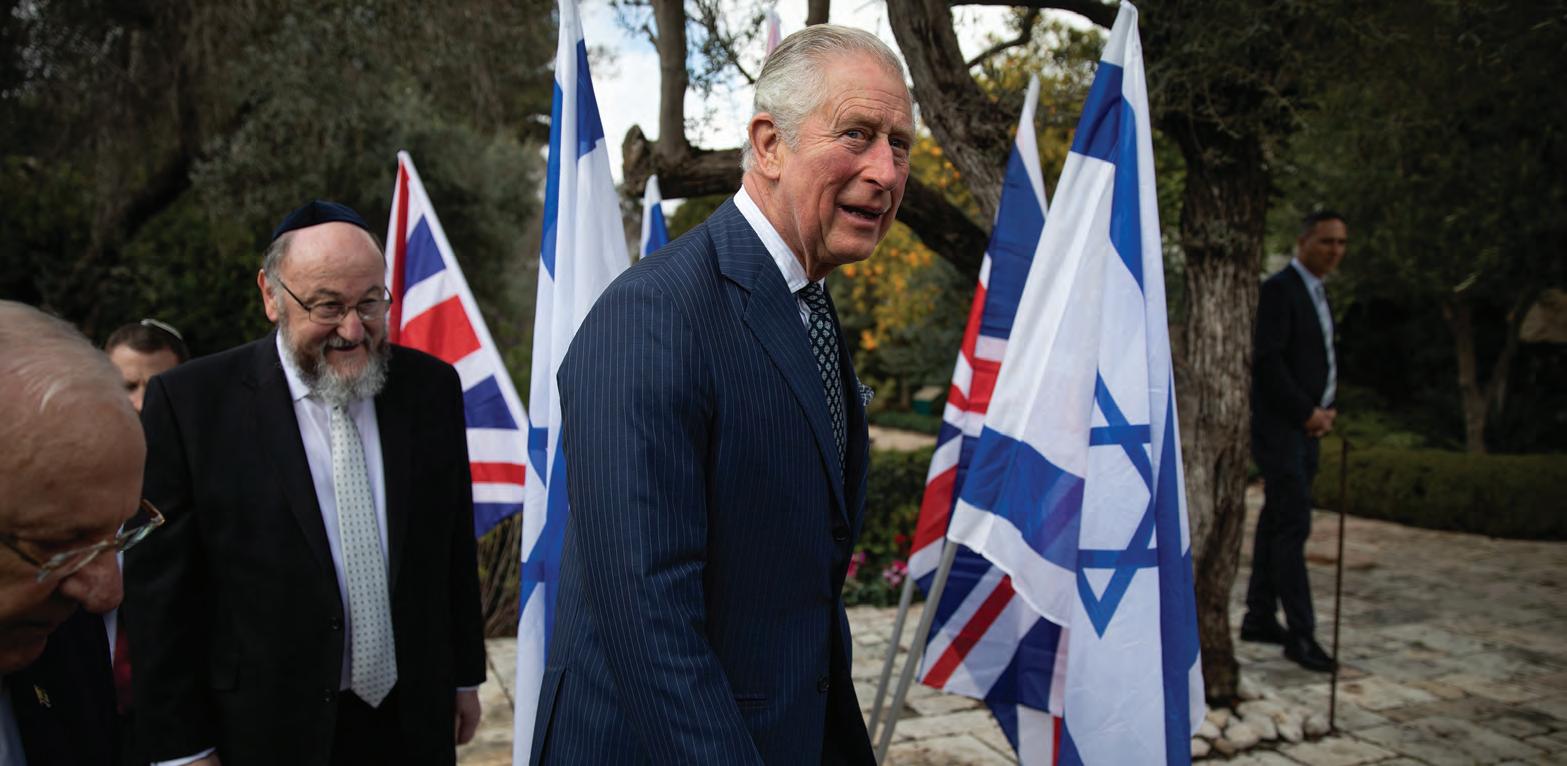

True, ancient Israel was a theocracy and was also eventually destroyed by internal divisions. Nevertheless, it developed a concept of governance that was to serve as a template for both Britain and America.
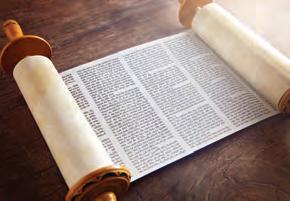
The genius of the monarchy invented by King David was that it brought together, as one governable nation, otherwise disparate and potentially warring tribes.
Even more revolutionary was the ancient Israelites’ concept of limited governance. Their king didn’t enjoy absolute power.
Turmoil Likely to Continue After Election

 Understanding Israel and world events from a Biblical perspective
Israel & Christians Today is the premier publication of Christians for Israel
Understanding Israel and world events from a Biblical perspective
Israel & Christians Today is the premier publication of Christians for Israel
6-7
Update on Ukraine
3 Political
10
The Giving of the Torah
16
Keeping Israel’s Neediest Children Safe
King Charles III, formerly the Prince of Wales, attends a ceremony at the residence of the President of Israel on 23 January 2020. | Photo: Flash90
October 2022 Tishrei - Cheshvan 5783 Continued on page 5 INTERNATIONAL www.c4israel.org | info@c4israel.org
Colophon
Israel & Christians Today is the premier publication of Christians for Israel.
Mission
Our mission is to bring Biblical understanding in the Church and among the nations concerning God’s purposes for Israel and to promote comfort of Israel through prayer and action.
Editorial Team
Andrew Tucker International Editor-in-Chief atucker@c4israel.org
Cathy Coldicutt
Managing Editor newspaper@c4israel.org
Marloes van Westing International Communications Manager international@c4israel.org
Ian Worby, Bryce Turner, Rita Quartel, Marie-LouiseWeissenböckand Marijke Terlouw
Scripture references: THE HOLY BIBLE, NEW INTERNATIONAL VERSION®, NIV®
Copyright © 1973, 1978, 1984, 2011 by Biblica, Inc.® Used by permission. All rights reserved worldwide.
C4I Offices
Christians for Israel International
Leon Meijer, Chairman
Rev Willem JJ Glashouwer, President Rev Cornelis Kant, Executive Director PO Box 1100 | 3860 BC Nijkerk, The Netherlands | Tel: +31 33 422 0405 info@c4israel.org | www.c4israel.org
The English Edition of Israel & Christians Today is published by the following English speaking branches:
Christians for Israel - Australia
Ian Worby, National Leader PO Box 1508, Springwood Queensland, Australia 4127 Tel: +61 (7) 3088 6900, info@c4israel.com.au www.c4israel.com.au
Christians for Israel - New Zealand
Bryce Turner, National Executive Director PO Box 12 006, Penrose, Auckland, New Zealand 1642 Tel: +64 9 525 7564, info@c4israel.org.nz www.c4israel.org.nz
Christians for Israel - Korea
Rev Paul Wonil Jung, Director Suite 3, 37 Railway Parade, Eastwood NSW, Australia 2122 Tel: +61 410 430 677 email: c4israelkorea@gmail.com www.c4israelkorea.org
Christians for Israel - USA
David Sudlow, Chairman PO Box 400, Front Royal, VA 22630,USA usa-info@c4israel.org www.c4israel.us
DISCLAIMER - Articles printed in Israel & Christians Today express the views of the individual authors and do not necessarily representtheviewsoftheEditorsorthatofthe Board of Christians for Israel. The printing of articles or advertising in Israel & Christians Today does not necessarily imply either endorsementoragreement.
©Christians for Israel International. Reproduction, or storage in a retrieval system or in any other form, is prohibited without permission. Please contact the Managing Editor should you wish to syndicate or republish any articles or materials appearing in Israel&ChristiansToday.
The Complexity of British/ Anglican/Israel Relations
Andrew Tuckern International Editor | Christians for Israel

Watching the funeral of Queen Elizabeth II, one cannot fail to be deeply moved by the images of the slow procession of the hearse from Westminster to Windsor Castle. Accompanied by hundreds of staff and military, attended by heads of state from around the world, surrounded by millions of ordinary people, Queen Elizabeth approaches her final resting place. She awaits the resurrection.
Queen Elizabeth is succeeded by her son, King Charles III. An era has ended, and another begun. What will it bring for UK/Israel relations?
Under a constitutional monarchy, the British Sovereign is both head of state and Supreme Governor of the Church of England.
Queen Elizabeth had a deep Christian faith. That in part explains her love for the Jewish people. Former Chief Rabbi Jonathan Sacks and his successor Ephraim Mirvis have spoken beautifully about the deep mutual affection between the Queen and the Jewish people in the UK. It is understood that King Charles and his heir Prince William share that connection and sympathy.
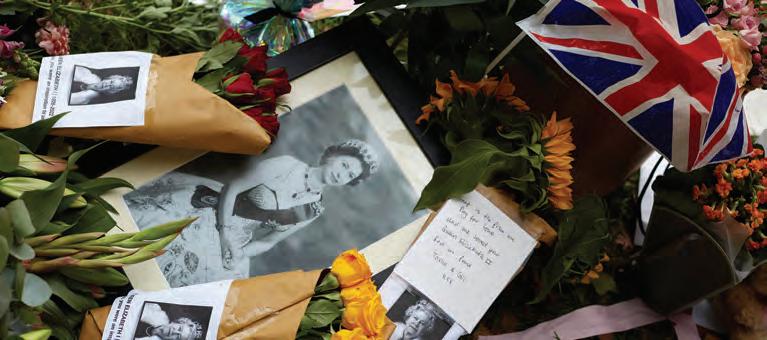
When it comes to the State of Israel, however, the picture is more complicated. As head of State, the King has a major challenge. Queen Elizabeth made about 250 offical overseas trips, to 129 countries. But she never visited Israel. This was because of unwritten Foreign Office policy banning British monarchs from visiting the Jewish State of Israel. To some extent, this was remedied by unoffical visits by Prince William and his father Prince Charles from 2018. But the fact remains that, fed by deeply rooted antisemitism and pro-Arab sentiments, the Foreign Office has a long history of antipathy towards Jewish sovereignty in Palestine. Can King Charles change this culture?
There is hope. One of Queen Elizabeth’s last official acts was to invite Liz Truss to become Prime Minister. Truss has publicly stated that she wishes to change
Prayer Points
By C4I Prayer Team
Israel
British policy towards Israel. She is is even prepared to contemplate moving the British embassy in Israel to Jerusalem. Whether she is able to break down the strong walls of anti-Jewish policies within the Foreign Office remains to be seen. But it is his role as Supreme Governor of the Church of England that may present the most difficult obstacle facing King Charles should he wish to translate his love of Jews into support for the Jewish State of Israel. It must be acknowledged that parts of the Anglican church have played a very positive role in relation to the establishment of the modern State of Israel. Think, for example, of the contribution of the Anglican Church’s Ministry Among the Jewish People (CMJ) and other Anglican evangelicals in the 19th century leading to the Balfour Declaration in 1917.
Today there are prominent Anglican clergy and lay leaders in many countries who urge support for the modern State of Israel based on theological principles (see Prof. Gerald McDermott’s New Christian Zionism).
Officially, however, the Anglican Church is highly critical of Israel. It denounces Israel’s sovereignty over Jerusalem.
Anglican Synods and Committees regularly condemn Israel for oppressing the Palestinians and infringing international law. The Anglican Peace and Justice Network (APJN) publicly condemns the ‘occupation’, and supports the Boycott, Divestment and Sanctions (BDS) movement and promotes establishment of
l As the mountains surround Jerusalem, so the Lord surrounds His people both now and forevermore. Psalm 125:2 Give thanks that the God surrounds His people forever. Pray that Israelis will be confident in this.
l US President Joe Biden visited Israel in July. During his visit he signed the Jerusalem Declaration promising to do everything possible to prevent Iran from obtaining nuclear weapons. It was also announced that Saudi Arabia has opened its airspace to Israeli flights after the Biden administration helped to broker the deal. Give thanks for these decisions and also pray that the US will always be an ally of Israel.
l Pray for all children in Israel. Many in southern and northern Israel grow up with the sound of air raid sirens going off regularly. Pray for God’s protection and comfort for these children when they are afraid. Pray that they may know they can always take refuge in God.
an Arab/Islamic Palestinian State in Jerusalem, Judea and Samaria.
This was reflected in a controversial Oped published last December by Justin Welby, the Archbishop of Canterbury, and Hosam Naoum, an Anglican Archbishop in Jerusalem. Reminding readers that the first Christmas took place against “the backdrop of the genocide of infants”, thus evoking toxic libels about the ‘ethnic cleansing’ of Palestinians, the authors blame Israel for “driving out” Christians for the region – despite the strong evidence that the Christian churches in Israel are growing and thriving.
The cause of these kinds of statements would appear to be a deeply rooted replacement theology. Institutionally, the Anglican Church has never adopted a statement along the lines of the Roman Catholic Church’s ground-breaking Nostra Aetate (1965). Adhering to the idea that the church has replaced the Jewish people, it does not accept that the literal ingathering of the Jewish people and their restoration to the land have any abiding Biblical significance in God’s economy.
Should they speak out favourably about the modern State of Israel, King Charles and Prince William will face opposition from within the Anglican church. Let us hope and pray that they will be inspired by the Holy Spirit to understand God’s purposes with the Jewish people, and have the courage to speak out God’s truth without fear or favour.
Israel & the Nations
l Amnesty UK announced a new line of merchandise titled ‘End Israeli Apartheid’. This action will probably lead to even more hatred and misunderstanding towards Israel. Pray that this campaign will be stopped.
l In early August, there was a brief war between the terror group Islamic Jihad in the Gaza Strip and Israel. After a few days, a ceasefire was agreed. Pray that the ceasefire remains in force and pray for Israel’s protection against the continuous threat from the Gaza Strip.
Christians for Israel
l Pray for the staff and volunteers of Christians for Israel worldwide. Pray for unity and good cooperation and that good ideas will continue to emerge to spread the message of God’s faithfulness to Israel.
l “Lord, are you at this time going to restore the kingdom to Israel?” (Acts 1:6). Pray that God will restore the Kingdom of Israel in our days.
For daily Prayer Points, go to our website www.c4israel.org
October 2022 | Israel & Christians Today Tishrei - Cheshvan 5783 Editorial2
London, England - 10 September 2022: Tributes, cards, messages, flowers and gifts left for Her Majesty Queen Elizabeth II in Green Park and around Buckingham Palace following her 70 year reign. | Photo: Shutterstock
www.facebook.com/c4israel
Political Turmoil Likely to Continue After Election
Yochanan Vissern Correspondent in Israel
Israel will go to the polls again on 1 November 2022, which will be the fifth time in three and a half years that parliamentary elections will be held in the Jewish state.
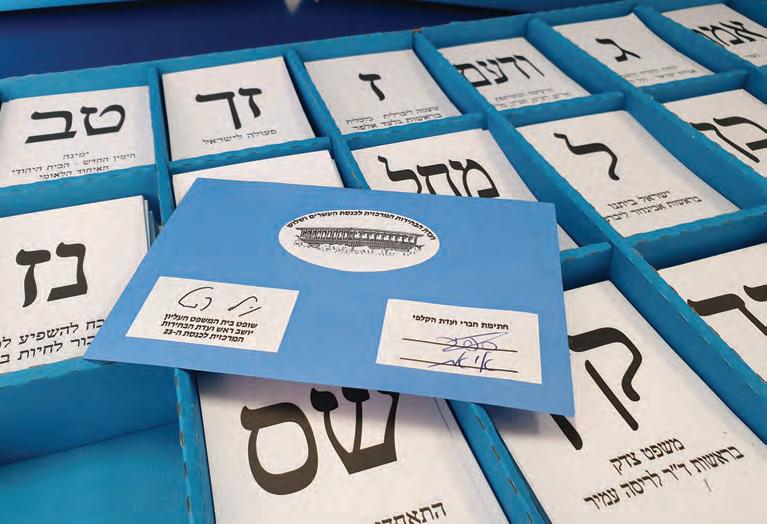
This new election became necessary after current Prime Minister Yair Lapid and former Prime Minister Naftali Bennett decided in June that there was no future anymore for their coalition of left and right parties supplemented by the Arab Islamic party Ra’am.
The government of Bennett and Lapid ruled for exactly one year before the decision was made to go to the polls again.
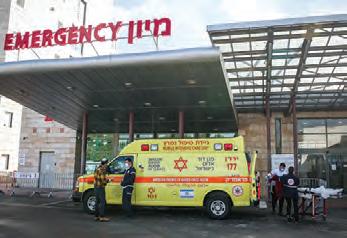
The new election for the 25th Knesset was necessitated by a series of crises related to the make-up of Bennett’s and Lapid’s cabinet.
The government that Lapid and Bennett had managed to cobble together a year earlier was a motley crew of parties with opposing political agendas.
parties refused to join a government led by the Likud leader because of resentment against Netanyahu.
In all three cases, it was not about political differences but an aversion to Netanyahu who was accused of being a criminal and
...it appears that the new election will again fail to resolve Israel’s deep political crisis that began with the fall of the government of Likud leader Benjamin Netanyahu in 2021.
After it became clear that there was no majority in the Knesset for the extension of an emergency law that dealt with Israeli civil administration in Judea and Samaria since the 1967 Six-Day War, Lapid and Bennett decided to call new elections.
However, it appears that the new election will again fail to resolve Israel’s deep political crisis that began with the fall of the government of Likud leader Benjamin Netanyahu in 2021.
Likud will remain the largest party with 32 seats according to the latest polls- up from 29 - but that won’t mean that Netanyahu will be able to form a majority government again.
The same happened in 2021 when Netanyahu failed to form a government despite the right’s clear victory in the March elections.
The so-called pro-Netanyahu bloc is currently at 59 seats in the polls against 54 for Yair Lapid’s center-left bloc while the rest of the seats are expected to go to the Arab parties.
The deadlock in the political situation in Israel is mainly due to personal feuds and not political differences.
Netanyahu had become an increasingly controversial figure in his 12 years as Israel’s Prime Minister especially since a lawsuit was brought against him for alleged corruption in the last two years of his term as PM.
In the previous election, three right-wing
living a hedonistic life as leader of Israel.
Yisrael Beiteinu leader Avigdor Liberman, for example, is known as a hawk with ideas shared by much of Likud but his dislike of Netanyahu was stronger than his political agenda.
The caretaker Finance Minister was actually the one who caused the current stalemate in Israeli politics when he stepped down as Defense Minister in November 2018 under the guise that Israel was acting too weakly against Hamas and the other terror groups in Gaza.
In fact, it was more about the corruption lawsuit against Netanyahu and a personal antipathy towards the Likud leader.
The same can actually be said about Naftali Bennett and Gideon Saar who, with their right-wing parties New Hope and HaBayit HaYehudi (Jewish House), teamed up with the center-left Yes Atid party of Yair Lapid.
Both politicians have also developed an aversion to Netanyahu during the time they served under him.
On the eve of the new elections on 1 November, all kinds of things are going on that make it likely that it will again prove difficult to form a government in Israel.
Caretaker Prime Minister Lapid tried to persuade the left-wing parties Labor and Meretz to form a joint list, but the attempt failed.
As a result, it is now possible that both parties will not exceed the 3.25 per cent
electoral threshold, making the formation of a center-left government, even with support from Arab parties, virtually impossible.
Analysts now agree that the so-called ‘soft right’ voters will decide the upcoming elections.
These are the voters who don’t feel at home in Likud or in the far-right Religious Zionism party.
The decision of Ayelet Shaked, Israel’s current Interior Minister, to disband the newly formed Zionist Spirit (Ruach Tzioni) party and return to HaBayit HaYehudi made things even more complicated because this party too will not cross the electoral threshold, according to the polls.
However, between now and 1 November, Shaked’s position may improve as she hasn’t started her campaign yet.
Yoaz Hendel, Shaked’s partner in the already defunct Zionist Spirit party, has now decided to leave politics warning that internal divisions, tribalism, and even blind hatred pose a great danger to Israel. Shaked has not ruled out in principle that she will join a Netanyahu-led coalition after the election. With that, she is likely to take on the role of kingmaker.
In the now outgoing coalition of Lapid and Bennett, that role was filled by the Arab Islamist Party Ra’am, which stands to lose the coming election according to the latest polls.
To complicate matters for Lapid, the Arab parties in the Knesset failed to once again form a joint list and this will mean that he won’t be able to form a new government and remain Israel’s Prime Minister.
However, the major stumbling block in the Israeli political landscape remains the obstruction of Benyamin Netanyahu, who has vowed to return to the Prime Minister’s residence in Balfour Street, Jerusalem.
Short News
Fast Check-In
In order to better handle the large flow of travellers, Tel Aviv’s Ben Gurion Airport will install self-service desks as much as possible by 2023. This will allow outgoing passengers to check-in faster, and allows them to weigh their own luggage and print and attach tags for them. About 10 million passengers have used Ben Gurion Airport since the beginning of the year and 2.3 million of them passed through during the month of August. With this investment of 2 million Israeli Shekel, it is hoped that their check-in time will be drastically reduced. | Photo: Shutterstock
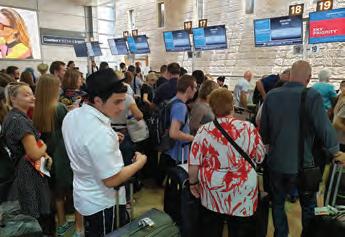
Israeli-Palestinian Economic Summit
Prime Minister Lapid has issued a green light for a summit on the IsraeliPalestinian economy. The summit has not convened in over a decade. The aim is to boost the Palestinian economy and promote economic relations between Israel and the Palestinian Authority.
Grant Packages for Immigrants
Immigrants in Israel who plan to live and work in the northern or southern regions of Israel can expect a grant from the government. Those eligible to receive the aid are immigrants who recently settled in the Negev and Galilee regions and include healthcare workers and engineers. There is a need for people working in these sectors in these areas. To give an indication, doctors get over 14,500 US dollars per family and people in other professions almost 6,000 US dollars. | Photo: Flash90
170 Attacks Prevented
Since the beginning of the year, Israel's security service Shin Bet has prevented at least 170 terror attacks. Prime Minister Lapid made this announcement mid-July. Even though quite a few terror attacks have been prevented, according to the Shin Bet report, there were 189 terror attacks in the month of June alone and 207 in the month of May. Most of these were firebombs. Attacks caused by throwing stones are not included in the figures.
Analysis 3
Box with ballots at one of the previous Knesset parliamentary elections. | Photo: Shutterstock
October 2022 | Israel & Christians Today Tishrei - Cheshvan 5783
Prof Dr Afshin Ellian: Iran and Israel
Andrew Tuckern International Editor | Christians for Israel
Since the revolution in 1979, Iran has been promoting the destruction of the Jewish State of Israel. How seriously should we take their threats?
We recently discussed this in the studio at C4I’s headquarters in Nijkerk with Prof Afshin Ellian, who fled Iran as a political refugee after the revolution in 1979. After studying law in the Netherlands, he became Professor of Jurisprudence at Leiden University.

Professor Ellian, welcome. Are the Persians enemies, or friends of Israel?
The current Islamic regime’s hatred towards the Jews is an exception. Historically, there has always been a deep friendship between Persians and Jews. We read in the Old Testament that the Babylonians destroyed Jerusalem and took millions of Jews into exile in Babylon. The Persians defeated Babylon, and their kings Cyrus and Darius enabled the Jews to return to Jerusalem and restore the Temple.
Later, when Xerxes was king, a Jewish girl Esther became queen of Persia, which was then the mightiest kingdom on earth. So, we Persians had a Jewish queen, who is today buried on Iranian territory. Many Iranians do not realise this and are amazed and very proud when I tell them.
Why is the book Esther important today?
Haman almost succeeded in convincing King Xerxes to destroy the Jewish people in his kingdom. His plan was was totally irrational, but it was very real. The lesson is: what starts as antisemitism can end in a planned attempt at genocide of the Jewish people. Europe failed to heed that lesson in the 20th century. The world’s current leaders have the responsibility not to ignore this lesson today.
Why is there so much hatred from Iran towards Israel?
After the 1979 revolution, Ayatollah Khomeini introduced a new project: he invented Israel as an enemy. Israel is of course not a threat to Iran. But Khomeini started to tell the people that Muslims must hate Israel. For example, he called on Muslims worldwide to celebrate the last day of Ramadam as Quds Day [Jerusalem Day].
Inventing the Jews and Israel as an enemy of Iran was a core part of the revolution, and a means to stay in power. Khomeini started killing people who opposed his regime, including those who questioned the war against Iraq. He said: “We must liberate Jerusalem, and the road to Jerusalem goes through Karbala, in Iraq”. At the time, we did not understand what Khomeni was saying. No-one knew where Jerusalem was, or why it should be liberated. We didn’t hate Jews.
What is the Islamic Revolutionary Guard Corps (IRGC)?
The IRGC is an autonomous organisation established by Ayatollah Khomeni to enable him to control the country, including the Iranian army. It is his instrument to mobilise the whole Muslim world to revolution. The foreign affairs department of IRGC (‘Quds Force’) undermines regimes in other countries that are opposed to its Islamic revolutionary ideology. It works through ‘proxies’, such as Hezbollah in Lebanon and Syria and many other militias in Syria; Hamas and Palestinian Islamic Jihad in Gaza and West Bank; the Houtis in Yemen; and also organisations in Iraq and Bahrain and elsewhere. These global activities of IRGC are hugely expensive. They are mainly financed by Iran’s sale of oil and gas – its largest export product.
In 2015, a Joint Comprehensive Plan of Action (JCPOA) was agreed between UN Security Council members (US, Russia, China, UK and France) plus Germany - lifting sanctions, in exchange for some sort of oversight regime over Iran’s nuclear project. President Trump withdrew from this regime in 2018. Now, the US Administration and EU leaders are trying to negotiate a new version of the JCPOA agreement with Iran. What is your opinion of these negotiations?
There is nothing wrong in principle with negotiation. But there are many problems with these negotiations.
The first is that the JCPOA agreement is for 15 years. Because the current negotiations are not for a new JCPOA, but for the old JCPOA to be revived, some of
Without Iran’s interference there would be no wars in these countries. Iran’s support for Assad enabled him to stay in power in 2011/2012 and was responsible for the civil war that erupted in 2012.
This idea suited Khomeni’s view – shared also by radical Sunni Iranian Muslims – that the Sharia [Islamic law –ed.] forbids a non-Muslim from governing Muslims in what has been Islamic territory. Jerusalem had been, of course, important Islamic territory.
Iran calls Israel the ‘little Satan’ and the USA ‘the big Satan’. Why does Iran hate the United States? As leader of Western civilisation, the USA presents a real threat to the regime. Many ordinary Iranians simply want freedom, and this has to be suppressed. So, in order to stay in power, the regime portrays the West as a threat to Iran’s existence.
those 15 years have already expired. The window for influencing Iran’s nuclear policies is thus very short.
This is a weak agreement that will enable Iran to achieve its revolutionary goals, by providing Iran with hundreds of millions of euros through sale of oil. The JCPOA also lifts sanctions that were imposed by the Security Council on sale of technology to help Iran develop ballistic missiles that can carry nuclear warheads.
Iran is the only UN Member State that has an institutionalised plan to destroy another UN Member State. While there is no evidence at this stage that Iran has plans to make a nuclear weapon, it clearly has plans to develop the capacity to make nuclear weapons.
Once it has the capacity to sufficiently enrich uranium, as well as the technology to build ballistic weapons, then it is just a small step to the creation of nuclear weapons that can be used to fulfil its plan to destroy Israel.
The money that Iran will receive will also be used to finance Iran’s proxies in other countries. I don’t know if Iran would ever use nuclear weapons to destroy Israel. They are not stupid. I think they will use nuclear weapons mainly as a threat to help them mobilise and equip its proxies like Hezbollah in Lebanon and Hamas and Palestinian Islamic Jihad in Gaza to attack Israel using smaller weapons.
There is another problem. If Iran develops nuclear bombs and ballistic missiles to deliver them, they will come into the hands of the fanatic elite in Iran. It is then just a question of time before radical regimes in other countries obtain the same capacity. This is deeply dangerous, because all the regimes are highly unstable.
It is also naïve to think that making money available to Iran is going to enable development of democracy. The regime in Tehran will not use the money it earns from lifting the sanctions to help its own people. Rather, it will use this money to suppress all opposition.
Does Israel have a right to attack Iranian targets?
The regime in Tehran promotes the killing of Jews and destruction of Israel and enables regimes in other countries to attack and wipe Israel from the map. Those two facts entitle Israel to defend itself, including attacking targets on Iranian territory that threaten its existence.
Europe has a refugee crisis. Half of the asylum seekers in the Netherlands in 2021 came from Syria and Yemen - both countries where war is instigated and maintained by Iran. Is Iran responsible for the refugee crisis in Europe? Yes. Without Iran’s interference there would be no wars in these countries. Iran’s support for Assad enabled him to stay in power in 2011/2012 and was responsible for the civil war that erupted in 2012.
Is there hope for peaceful cooperation in the Middle East?
My biggest dream is that the regime in Tehran will stop the aggression against Israel and start solving its own internal problems. On that day, we will discover that we can help Israel and the Palestinians to talk rather than fighting each other. The Abraham Accords give hope for the future.
Afshin Ellian (born 27 February 1966 in Tehran, Iran) is an Iranian-Dutch professor of law, philosopher, poet, and critic of political Islam. He is an expert in international public law and philosophy of law.
Interview4
Prof Dr Afshin Ellian being interviewed by Andrew Tucker. | Photo: Christians for Israel
October 2022 | Israel & Christians Today Tishrei - Cheshvan 5783
The Queen is Defender of Britain’s Faiths
The Rabbi Sacks Legacyn Punctuality, said Louis XVIII of France, is the politeness of kings. Royalty arrives on time and leaves on time. So it is with Her Majesty the Queen, with one memorable exception.
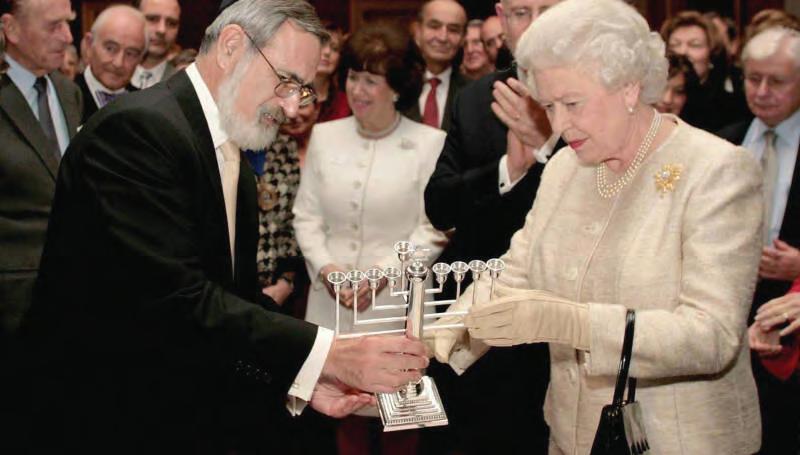
The day was 27 January 2005, the 60th anniversary of the liberation of Auschwitz, and the place St James’s Palace. The Queen was meeting a group of Holocaust survivors. When the time came for her to leave, she stayed. And stayed. One of her attendants said that he had never known her to linger so long after her scheduled departure. She gave each survivor — it was a large group — her focused, unhurried attention. She stood with each until they had finished telling their personal story.
It was an act of kindness that almost had me in tears. One after another, the survivors came to me in a kind of trance, saying: “Sixty years ago I did not know if I would be alive tomorrow, and here I am today talking to the Queen.” It brought a kind of blessed closure into deeply lacerated lives.
We don’t always appreciate the Queen’s role in one of the most significant changes of the past 60 years: Britain’s transformation into a multi-ethnic, multifaith society. No one does interfaith better than the Royal Family, and it starts with the Queen herself. Already in 1952, the first year of her reign, she was patron of the Council of Christians and Jews, the organisation founded by the Archbishop of Canterbury William Temple and the Chief Rabbi Joseph Hertz in one of history’s darkest nights ten years earlier.
In England, almost uniquely, the Church stood alongside the Jewish community in its fight against antisemitism. Royal recognition of the significance of this effort gave interfaith work a centrality and prestige it would not otherwise have had, and it helped to make tolerance the default option in British life.
Americans in particular find this hard to understand. How, they ask, can you have real tolerance in a country with an Established Church? Doesn’t it relegate everyone else to the margins of national life? To this the answer is
Continued from page 1
The Momentous Task Facing King Charles III
He was constrained from below by the authority vested in priests, prophets and judges, and from above by the belief that the supreme ruler whose laws even the king had to follow was the Almighty himself.
During the 17th-century English civil war, which led to the system of parliamentary government under the Crown, political thinkers looked to Judaism for the answer to many questions about the relationship between scripture, sovereigns and subjects.
Under Oliver Cromwell, some even advocated turning parliament into a sanhedrin or supreme council patterned on the biblical high court of Judea.
Just as Britain’s constitutional monarchy is generally not understood in republican countries, nor is the relationship in Britain between church and state in which the Crown plays a central role.
Britain has an established church in the Church of England. Because it is benign and tolerant, it acts as a protective umbrella for other minority faiths such as Judaism. It prevents a contest for power between faiths in which Judaism would be the loser.
The monarch is the Defender of the Faith, meaning Protestantism. The Queen, who treated this role with the utmost seriousness, was a devout Christian. In 1994, when Charles was Prince of Wales, he caused no little consternation when he said he wanted to be not Defender of the Faith but ‘defender of faith.’
Long attracted by elements of Islam in particular, he
no. In her religious role, the Queen is head of the Church of England, but in her civic role she cares for all her subjects, and no one is better at making everyone she meets feel valued.
That applies not just to individuals but to all Britain’s faith communities. In one of the first public occasions of her Diamond Jubilee, the Queen met at Lambeth Palace leaders of the nine leading faiths in Britain: Christian, Jewish, Muslim, Hindu, Sikh, Buddhist, Jain, Zoroastrian and Bahai. Each showed her an object that held special significance for them. In return she praised their contributions to the nation. They helped the sick, the elderly, the lonely and the disadvantaged. More and more, she said, the Church of England was actively cooperating with other faiths to build a better society. Faith, not just Christian faith, reminds us of “the responsibilities we have beyond ourselves.” It was gently, deftly done.
The royals — all of them, especially the Duke of Edinburgh and the Prince of Wales — have done outstanding work with the faith communities. To see Prince Charles lighting Chanukah candles with children at a Jewish school, or being adorned with flowers by appreciative Sikhs at the Royal Albert Hall, or visiting the Hindu temple in Neasden for Diwali, is to see royalty at its best. No one doubts the duty of a monarch to defend the Established Church, but it is precisely those for whom faith is important who can best understand how important other faiths are for their adherents. Oddly enough, the religious dimension of the throne makes it better placed than secular institutions to value and unite Britain’s many faiths.
Jews have deep respect for the Queen and the Royal Family. We say a prayer for them every Sabbath in synagogue. We recite a special blessing on seeing the Queen. We drink a toast to her at every communal dinner. Whether I am in America or Israel or the Far East
believes that all faiths are linked by a common spirituality that promotes the unity of the natural world.
This raised fears among many British Jews (and others) that he would promote a multifaith mishmash and thus undermine the protection that the Jews have enjoyed. However, he explained that he merely wanted to use his Christian standpoint to offer protection to other faiths.
And in his first address to the nation after his mother’s death, he pledged to uphold the sovereign’s particular responsibility towards the Church of England.
The King has shown much friendship and warmth towards British Jews. However, many Jews have interpreted the failure of his mother ever to visit Israel as a signal of antipathy towards the Jewish people within the royal family.
This is a misunderstanding. The royals undertake no engagements overseas unless the UK Foreign Office wants them to do so. And British government ambivalence about the Jewish national home goes back to the Mandate period in the 1930s and 1940s, when Britain betrayed its obligation to settle the Jewish people throughout Palestine.
In fact, first Prince William and then Prince Charles, as he then was, did make official visits to Israel in 2018 and 2020, which were almost certainly due to a shift in the government’s attitude. This was caused by an increasing number of pro-Israel ministers in the Conservative administrations of Theresa May and Boris Johnson, combined with the developing relationship with Israel by the Gulf states towards which the British government has long been obsequious.
It is an irony that today’s State of Israel, the direct heir to
one of the first questions I am likely to be asked is: “How was the royal wedding?” Something similar, in my experience, is true of other minority faiths in Britain. They value the Queen because they know she values them. She makes them feel not strangers in a strange land, but respected citizens at home.
Her presence and her family’s role as the human face of national identity is one of the great unifying forces in Britain, a unity we need all the more, the more diverse religiously and culturally we become. Hers has been the quiet heroism of service, and in an age of self-obsession she has been a role model of duty, selflessly and graciously fulfilled.
Recently, presenting the Queen with a loyal address, the President of the Board of Deputies of British Jews gave her the traditional Jewish blessing for long life, Ad meah ve-esrim, “May you live to be a hundred and twenty.” Not having heard this blessing before, she gave a quizzical smile. We had to explain that the figure was not meant to be precise. It was just our way of offering her our loyal thanks and our prayers that she may continue for many years in health and strength. She has been a blessing to us, the nation and the world.
Article by the late Rabbi Lord Jonathan Sacks published 31 May 2012.
the ancient Davidic kingdom, doesn’t have a monarchy. Maybe that’s one reason why its internal divisions are so raw—and potentially so dangerous to its long-term health.
Although America was created by rejecting the British Crown, the Hebrew Bible is integral to foundational American institutions and laws. The Liberty Bell is engraved with an inscription from Leviticus: “Proclaim liberty throughout all the land unto all the inhabitants thereof.” America’s founding fathers made repeated references to biblical sources.
Few, however, acknowledge the central importance of biblical values, which have been under sustained assault for decades from secular ideologies such as moral and cultural relativism, in underpinning the West. Principles such as duty to others, humility and gratitude for the world’s many gifts originated in the Hebrew Bible.
The Queen embodied and upheld these values. Unlike Charles, who took a stand on a number of issues as Prince of Wales, no one ever knew what his mother thought. Avoiding anything that might cause division, she thus simply embodied selflessness, stoicism and public service. And like Judaism itself, she also radiated hope for the future.
That’s why she was so loved. That’s why there has been such terrible grief in Britain over the death of a 96-yearold woman—because people fear that, with her death, so, too, a Britain is passing that once stood for the principles and the society that she personified.
We wait to see whether King Charles III, the latest British monarch in the Davidic tradition, will similarly rise to that momentous task.
5News
Queen Elizabeth presented with a menorah by Rabbi Jonathan Sacks. | Photo: Rabbi Sacks Legacy
October 2022 | Israel & Christians Today Tishrei - Cheshvan 5783
Update on Ukraine
Someone Up There is Holding My Hand
Anemone Rügern Project Coordinator - Holocaust Survivors in Ukraine | Christians for Israel


It’s a hot summer day in the pedestrian zone of West German Dusseldorf; the vendors are setting up their booths for the city’s popular Gourmet Festival.
Yelena, our contact person from the Jewish Community in Nikolayev, has taken a few days off for the first time since the war started in Ukraine this spring, hoping to catch her breath with friends in Dusseldorf. Nikolayev, a port city, located on Ukraine’s Black Sea coast, once claimed to have the Soviet Union’s largest shipbuilding wharf. Many seniors, supported by Christians for Israel, used to work there when they were younger. Since the collapse of the Soviet empire, Nikolayev – just like many other cities throughout the country – has seen most of its factories and plants go out of business. When the war started with Russia’s invasion on 24 February this year, Nikolayev immediately found itself a target due to its strategic location. Unlike the neighbouring port city of Kherson, Nikolayev has not come under Russian occupation, but the daily air raids are wearing people out. I meet Yelena and her husband Andrei at a Dusseldorf café. By the time we say goodbye, the sun has nearly set behind the horizon. Yelena instinctively cringes every time she hears an ambulance or another alarm.
“Normally, you get an air alarm so that people can run for cover. But in Nikolayev, you either wake up the moment the bomb hits, or you don’t wake up at all,” says Yelena. “We are so close to Kherson. That’s where the Russian troops sit; that’s where they are firing from. By the time the air sirens go off, the next rocket has already hit.”
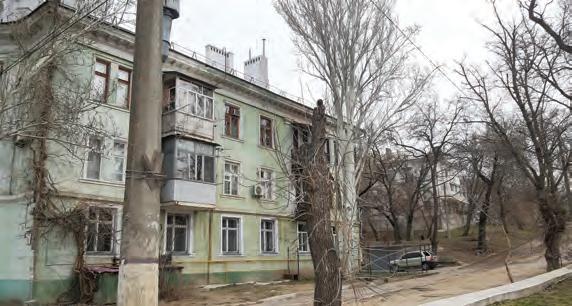
At the beginning of the war, it looked like Nikolayev was going to suffer the same fate as Kherson. “The Russian tanks were already in the city, just a block away from us,” Yelena remembers. “Then there was a fight at the downtown World War II tank memorial; that’s where our troops pushed them back. The frontline has been pushed 40 kilometres outside the city since the end of March.”
With the outbreak of the war, food supplies started disappearing from the supermarket shelves. “The first three weeks, we didn’t change; we were always on our toes,” Yelena says. “But where should we have run to? We have a small house in the city centre. There are no shelters there. In the beginning, they said we’d be safe in the centre as there are no military targets there. And then they bombed our city administration. There were so many casualties…
“I sat in the dark hallway with all curtains closed and worked, with my laptop on my knees, the phone next to me and the hand-knitted scarf you brought last year
around my shoulders. That’s what gave me comfort.”
After a while, food supplies re-appeared in the city, but prices skyrocketed. People made panic purchases; the shops were not able to keep up with the demand.
“And when Passover started, we had no water. We get our water from Kherson, but the city is occupied, and the pipes have been damaged. We couldn’t wash anymore; it was unbearable. Once in a while, a truck stopped in the street, bringing drinking water. People stood in line for three hours.
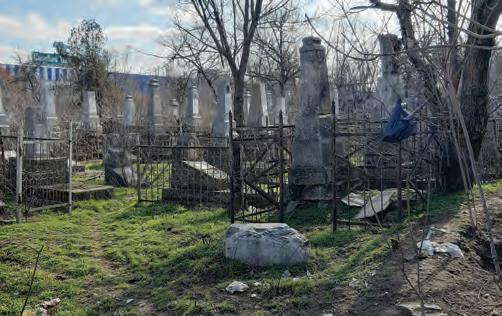
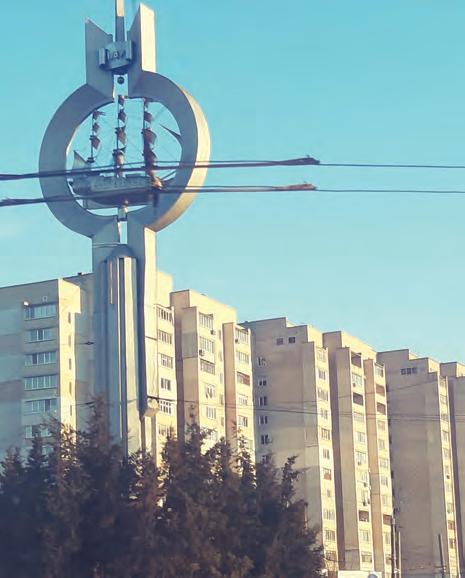
“Now we get our water from the sea – it’s salt water. You can’t drink it; it’s just for household use. But the salt wrecks everything. We had to buy a new boiler because everything starts rusting.”
Once a week, the synagogue distributes drinking water and food to the needy.
“In the first weeks after the war started, we brought 800 people out of the city. Most of them continued via Moldova to Israel,” Yelena remembers. “When we distributed the first humanitarian goods, about 50 people responded. Now it’s about 500. We couldn’t understand where they were all coming from. ‘We were okay before,’ many said. But most factories have been closed for months; there is no work. Every day our city gets attacked. People now mainly live on humanitarian aid. When the curfew is lifted at 5 in the morning, the first people go and stand in line.”
International solidarity is slowing down, Yelena has noted. “People don’t want to hear about the Ukraine war anymore. It has taken too long already.” Yelena works for a donations-based organisation. She hasn’t received her salary for a month.
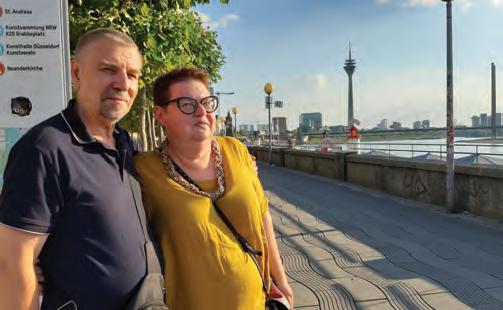
But her biggest concern are the two bridges across the Southern Bug River. “The centre of Nikolayev is like a peninsula. The two large bridges are our lifeline with Odesa and the rest of Ukraine. I hope they won’t get hit; that would be the end.”
There is hardly anyone left at the synagogue except Yelena. But the work is still there. For the elderly, who have spent their entire lives in this city and who mostly have no younger relatives, it is nearly unthinkable to start anew somewhere else. Yelena continues taking care of them – now under constant danger of death. No one dares think about the winter. The heating systems have been damaged in many places; there are no construction materials to make the necessary repairs, such as replacing broken windows.
Although Yelena would not describe herself as a religious person, she feels that she is not alone. “There is someone up there who is taking me by my hand, step by step. I’ve sensed that since the first day of the war.”
6
Nikolayev on the Black Sea used to have a huge shipbuilding plant in Soviet times. | Photos: Anemone Rüger
October 2022 | Israel & Christians Today Tishrei - Cheshvan 5783
Several thousand Jewish people are still living in the city. Many receive regular support from C4I. | Photos: C4I
Yelena and her husband Andrei in Dusseldorf.
Nikolayev had 25,000 Jewish residents before World War II. Those who were not able to flee were murdered in the Holocaust.
Ukraine
We Remain Watchful and Prepared
Interview with Koen Carlier
Marijke Terlouwn Christians for Israel Netherlands
Anyone who thinks that, now that the first stress of war in Ukraine is over, Koen Carlier can return to a quieter life, does not know him well. In fact, he is busy every day. Busy helping Jewish people in Ukraine leave for Israel and trying to help needy members of the Jewish community who remain in Ukraine for now. Recently I spoke with Koen Carlier about the current work in Ukraine, as well as reflect on those first worrisome months. First, we look back.
Koen says: “We were actually already planning ahead from last November for what could possibly happen. At that time, we were saying: “We pray and hope for the best and prepare for the worst.” Our preparations included stockpiling food and fuel, arranging shelters and mattresses. So when the war started on 24 February, we were prepared.”
What has stuck with you from the early days of war? “You can be prepared, but the situation is always different from the expected. Yet it was good that we could use all that we had prepared. We were able to stay - we didn’t have to leave the city, or flee. That allowed us to continue doing our work, even though circumstances were hard. Because you don’t know what the outcome will be. It was a very uncertain time. Among our team, there was some panic at first. Quite understandably. But together, we decided: we will continue as long as we can.”
During the first weeks and months of the war, what did the work consist of?
“It was impossible for us to distribute food parcels for a while. That is something we always do at set times. Fortunately, we had already distributed extra food parcels ‘just in case’ in those places we could no longer reach because of the war. But in the early days, we were working non-stop to take in refugees, who we managed to bring to safety via Moldova and Romania and get them to Israel. One of our drivers was, and still is, stationed in Western Ukraine to help Jewish families leaving via Poland to Israel in cooperation with the Jewish Agency.”
How many people have you helped in the past few months?
“From the beginning of the war, we have been able to help about 6,000 Jews. Actually, an unprecedented number if you consider that in 2021 a total of 6,000 Jews left from all over Ukraine, and we could help 2,500 of them.”
How were you able to manage it all?
“Because the opposite of what you might think happened: a huge number of local volunteers came to help us.”
Meanwhile, we have entered the next phase of the war. What is the situation like now?
“We continue to do our work. Of the Jews we help, about 50 per cent are refugees from war zones, and the other
half are people who, under normal circumstances, would also leave for Israel. We are grateful that we could resume the other part of our work: visiting Holocaust survivors and distributing food parcels.”
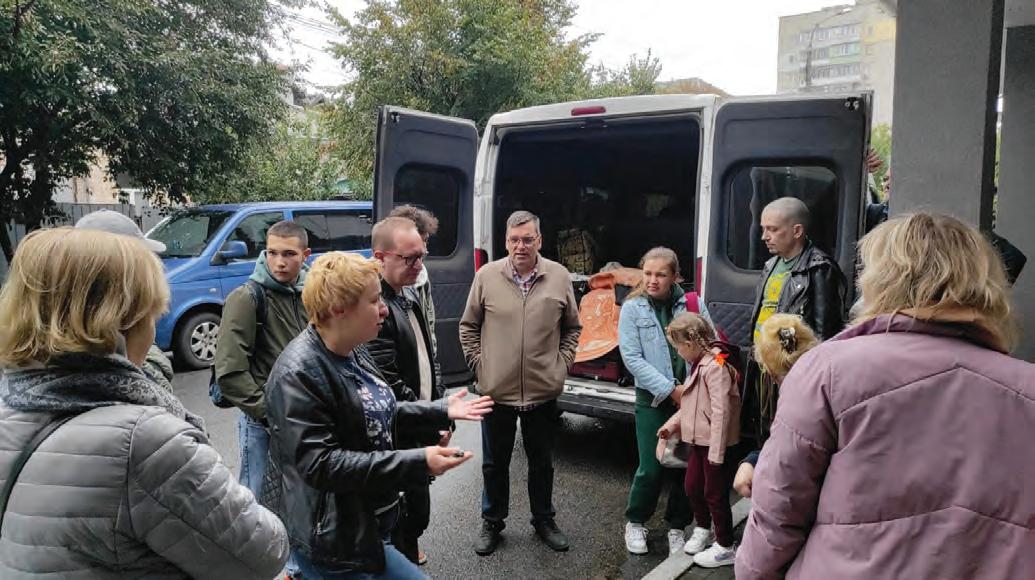
What’s next, Koen? Winter is coming, and the winters in Ukraine can be really harsh.

“There are many uncertainties. Will there be gas soon? Will there be water? Frankly, I think we should expect a new flood of refugees, and I hear that from others around me as well. People are talking about perhaps two to three million refugees when winter comes. Especially if there is no more heating, hundreds of thousands are expected from the east and south. That is why we are already preparing. We are preparing the shelters. We ensure fuel is available. Our minibuses go to the garage for extensive maintenance, we stock food.”
In light of the Bible, how do you see the present time?
“For a long time, this was a closed region for Jews who wanted to go to Israel. Until December 1991, hardly anyone could leave. When the Iron Curtain fell, there was a massive exodus, mainly because people thought it would only be for a short period of time that they could leave. But in Zechariah 2 it says: ‘Come! Come! Flee from the land of the north!” declares the LORD’. Who says the borders will remain open? Look at Russia; departure for Jews from that country has now become extremely difficult. So we must remain watchful and prepared.”
The supporters of Christians for Israel gave generously to the emergency fund for Ukraine. Therefore you could offer help without having to worry about finances. Did this help?
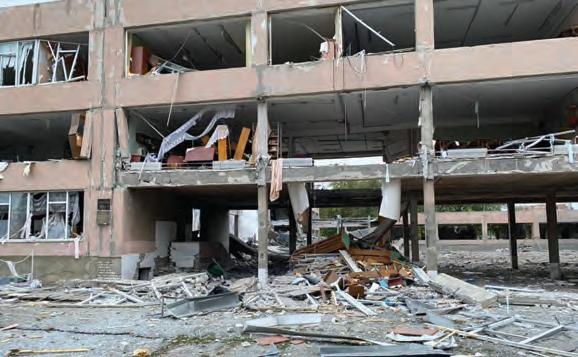
Our Work in Ukraine
Although the groups of people that leave the country are smaller, our team continues to help mainly Jewish elderly, mothers and children from the war zone via Moldova to Israel. Now that temperatures drop below freezing for many there will be a time to decide: “Will I try to survive without basic needs or do I choose to flee?” Especially for elderly it is hard to leave their familiar surroundings. We try to support them and encourage them to leave for Israel.
It costs € 135 | US $150 to assist a Jewish person from Ukraine to make Aliyah. Any amount is welcome!
Our team assisted
Holocaust Survivor Leonid and brought him to Kishenov for his flight to Israel. The war forced him to make Aliyah. There were constant sirens and rockets not far from his apartment in Uman and he was worried that he would not be able to survive the war.
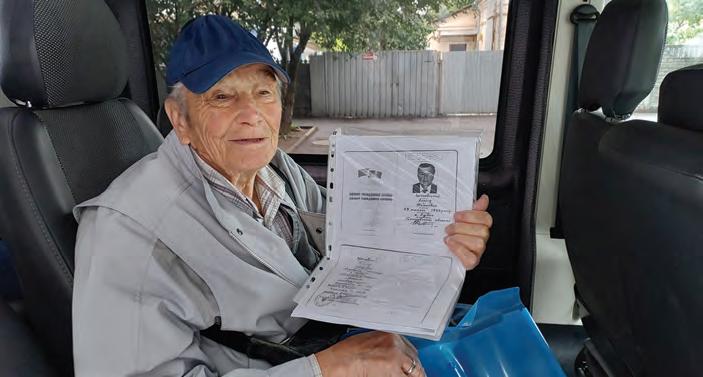
“This is so very special and it absolutely helped. But I would like to put it differently. Dear readers, we, meaning the whole Christians for Israel team in Ukraine, truly experienced how important your prayers for us are. Your prayers have really been the fuel for our work and for our protection. We continue our fieldwork, and that goes hand-inhand with your prayers.”
To donate, complete the coupon on page 16.
7Aliyah -
October 2022 | Israel & Christians Today Tishrei - Cheshvan 5783
Every week we have a few trips with olim (immigrants) to Kishenov, Moldova, where they receive their visa for Israel and then leave for the airport.
88-year-old
7-year-old Kseniya fled the violence of war from Kherson (south-east Ukraine) and is now finally making her way to Israel with her parents and two little sisters via Kishenov assisted by C4I.
Although the Ukrainian army made gains especially in the north-east in Kharkiv Province, the Russian army’s rocket attacks on schools and civilian targets continue.
Australia Stands Beside Israel
Ian Worbyn
National Leader | Christians for Israel Australia
Christians for Israel Australia, together with several other pro-Israel Christian groups, held very successful Australia Standing Shoulder to Shoulder with Israel events, in Brisbane and in Queensland’s Sunshine coast to welcome the new Israeli Ambassador to Australia, His Excellency, Amir Maimon.
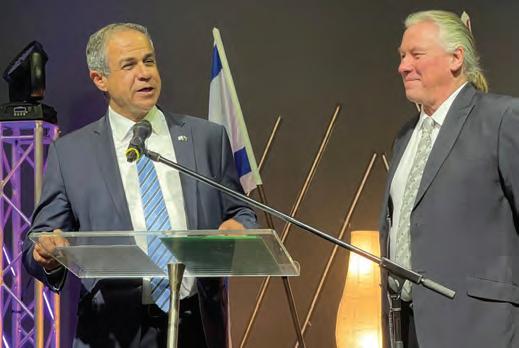
This initiative was the result of three months of planning in a joint venture among between Christians for Israel, Bridges for Peace, Southern Cross Alliance for Israel, Beersheba Vision, Pray for Israel, ICEJ, the Zionist Federation of Australia, and the Queensland Jewish Board of Deputies.
The events were attended by about 200-300 at each venue. The Ambassador was warmly received with
standing ovations, and some very moving musical renditions of a couple of well-known Jewish songs that brought a huge smile to the Ambassador, who joined in the singing and celebration.
Short video clips introduced the Ambassador with a brief history of his family. Some of his ancestors were among the first immigrants to make the long and arduous journey from Yemen to Israel over 100 years ago. We also learned that the Ambassador left a very distinguished stellar career in the Israel military. He was the commander overseeing Operation Solomon that saw the world’s biggest airlift of nearly 20,000 Ethiopian Jews, bringing them back to the promised land of Israel, partially fulfilling one of the prophetic scriptures stating that God would bring home his people on eagles wings.
Other speakers from the Jewish community and from the
Australian Light Horse association gave encouraging addresses relating stories of Australia and Israel’s long and close relationships from the First World War up to the present time. We were reminded that Australia was the first nation to vote yes on Israel being recognised as a sovereign state in 1947.
The ambassador later spoke on Vision Christian national radio, saying that he was deeply moved by so many supporting Australian Christians, and hoped to see more of these events continue across the nation.
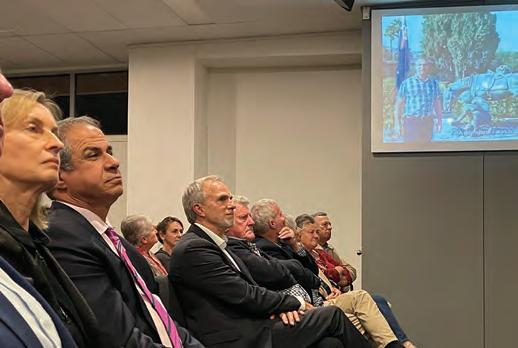
Indeed, as a result of these wonderful examples of solidarity and unity within the Christian and Jewish communities, moves are afoot to plan and organise similar events in other state capitals such as Melbourne and Sydney, Adelaide, Perth and perhaps even Hobart and Darwin.
Israeli Seminar in Denmark
Marie-Louise Weissenböckn Christians for Israel Austria
On Saturday, 17 September 2022, the Danish branch of Christians for Israel International, ‘Kristne for Israel
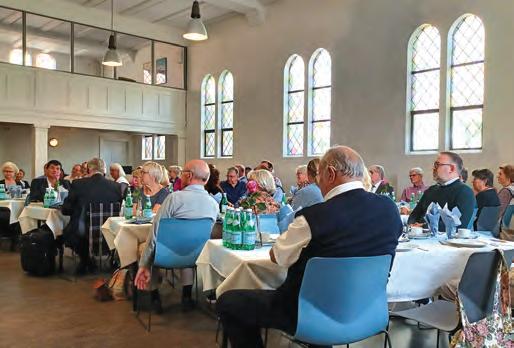
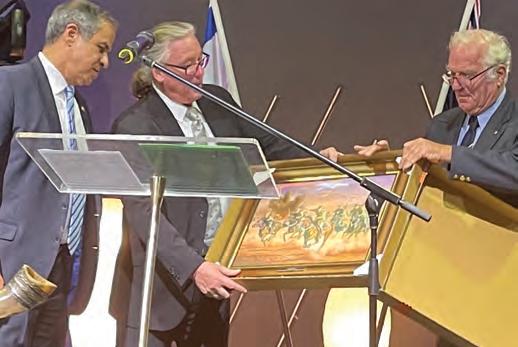
Danmark’, hosted Reverend Willem Glashouwer, the President of Christians for Israel, for a teaching on Israel and the Church in Copenhagen. Other keynote speakers were Jenis av Rana, the Minister of Foreign Affairs and Culture of the Faroe Islands and Max Meyer, the head of the Danish Zionist Federation.

After introducing the mission and the vision of Kristne for Israel in Denmark, the Chairman, Per Nielsen, invited Minister Jenis av Rana to address the 60 participants, mainly pastors and church leaders of congregations in and around Copenhagen. In his speech, the Minister, a devoted Christian, spoke about his endeavour to open the Embassy of the Faroe Islands in Jerusalem. In both the Faroe Islands and Denmark, the political opposition to the idea of placing the diplomatic office in Jerusalem was very strong. As he didn’t want to lose the opportunity to open a diplomatic office by sticking to the idea of Jerusalem, it was opened in Tel Aviv on 22 May this year.
Hoping that it will be moved to Jerusalem one day, he concluded that his staunch support for Israel stems from the fact that he loves Jesus and Jesus was a Jew.
Max Meyer, who spoke as the head of the Danish Zionist Federation, reported his efforts to bring young Danish politicians and members of political youth movements to Israel. He speaks widely, teaches about antisemitism, being a Jew and the significance of Israel. To his great regret, most of the churches he contacted show no interest. The impact a visit to Israel has on young leaders motivates him to continue his work.
After a wonderful lunch, Rev Willem Glashouwer delivered a thought-provoking teaching on the theme Israel and the Church, responding to the previous speaker that, indeed, the Church, for the greater part, had lost its interest in Israel.
The early Church Fathers had mostly agreed that God had rejected the Jews and Israel, for they had rejected Jesus. The shock to Christianity came in 1948. To the utter amazement of the Church, Jews were returning to the promised land, the State of Israel was established, and in 1967 Jerusalem was reunited. This started a slow process of rethinking in the Christian world.
What makes the Jewish people so special is that God chose them to bless the world – as an instrument to set the whole of Creation free. Jesus himself states (John 4,22) that “Salvation is from the Jews.” “You worship what you do not know. We (the Jews) worship what we do know”, Jesus said to the Samaritan woman, implying that God had revealed His will to the Jewish people and gave them
a deep understanding of who He is. He didn’t do it for their sake but for the sake of the salvation of the world.
He created the Jewish nation and gave them His land to bless the world. Salvation was from the Jews, is from the Jews and will be from the Jews, Glashouwer continued.
The return of the Jews to the land of their forefathers is the final wake-up call for the Church. This is not Israel theology. This is about the heart of God.
Salvation was from the Jews when He revealed the Torah to the Jewish people. The Word of God was meant to direct to a healthy, prosperous, and righteous life.
Herewith He blessed Israel. Salvation is from the Jews as Jesus himself is a Jew. He kept the law - made with Israelperfectly and thus could take away the sins of the world.
He had to be someone who had been born in the framework of the law. He had to be Jewish. And salvation will be from the Jews when Jesus returns, He will sit on the throne of David, rule over Jacob, the nations will walk in the light of the Torah and there will be war no more.
8 C4I News
Ambassador Amir (in pink tie) with other Jewish and Christian leaders. On video screen, Amir at Australian Light Lorde Memorial in Israel
October 2022 | Israel & Christians Today Tishrei - Cheshvan 5783
Ambassador Amir with Peter Schuptar from Pray for Israel at the event held in Brisbane.
Ambassador Amir presented with a painting: Charge of the Australia Light Horse at Beersheba by Peter Schuptar and Barry Rogers.
Participants at the seminar. | Photo: Marie-Louise
From left to right: Max Meyer, Jenis av Rana and his wife, Per Nielsen, M-L Weissenböck and Rev W Glashouwer.
Centenary of the Mandate for Palestine: Part 2 - The Paris Peace Conference of 1919
Hugh Kitsonn Writer, Director and Producer of the Whose Land? documentary
On 31 October 1918—exactly one year after the Allied victory at Beersheba and the War Cabinet meeting that decided on the Balfour Declaration—the Ottoman Turks surrendered and World War One on the Eastern Front came to an end.
At 11am on 11 November 1918 the guns on the Western Front, too, fell silent and the war finally finished.
The War to End All Wars
The carnage of the previous four years had been unprecedented. Many hoped that the Great War, as it was then known, would be ‘the war to end all wars’. To ensure that end, the victorious Allied powers called a peace conference in Paris, which commenced in early 1919, at which a series of treaties were signed, including the Treaty of Versailles and the Treaty of Sèvres.
On the eve of the Paris Peace Conference the leader of the Zionist Organisation, Chaim Weizmann (who would later become the first President of the State of Israel in 1948) met with the recognised leader of the Arab world, Emir Feisal, son of Hussein bin Ali, Sharif of Mecca. They came to an agreement that has since been virtually expunged from the annals of history—perhaps deliberately.
Detractors of the concept of a Jewish national home in Palestine prefer to call attention to two agreements that are alleged to have been made before the Balfour Declaration – one from 1915 and the other from 1916.
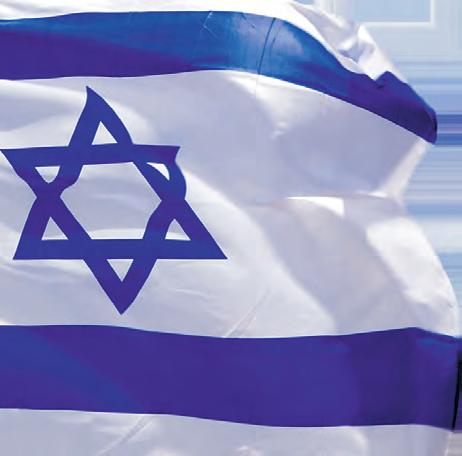
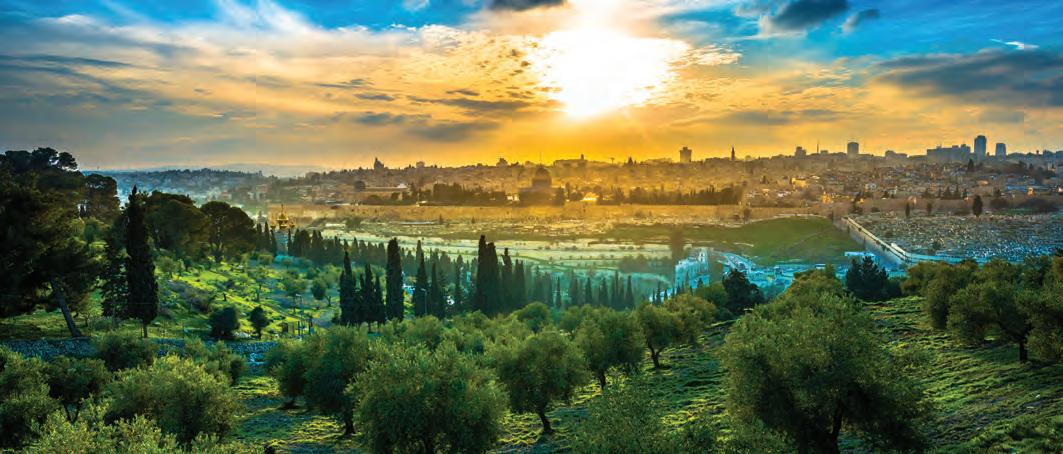
1915: The McMahon-Hussein ‘Agreement’
In 1915, while Sir Henry McMahon was the British High Commissioner of Egypt, he entered into correspondence with Feisal’s father, Sharif Hussein, to bring about a universal Arab uprising against the Ottoman Turks. In return McMahon is alleged to have promised Arab independence in territory that was under Ottoman rule. The correspondence became known as the ‘McMahonHussein Agreement’.
The Arab uprising, led by T E Lawrence (Lawrence of Arabia) was only a partial one and, according to the late Professor Isaiah Friedman, the correspondence between McMahon and Hussein contained more disagreement than agreement, and was never finalised. Years later, Sir Henry McMahon wrote in The Times:
“I felt it my duty to state, and I do so definitely and emphatically, that it was not intended by me in giving this pledge to King Hussein to include Palestine in the area in which Arab independence was promised. I also
had every reason to believe at the time that the fact that Palestine was not included in my pledge was well 1understood by King Hussein.”
1916: The Skyes-Picot ‘Agreement’ The other agreement, known as the ‘Sykes-Picot Agreement’, was made the following year. It was a secret memorandum between Sir Mark Sykes and François Georges-Picot, who were British and French diplomats respectively. The intention was to come to an agreement regarding the spheres of control that Great Britain and France would have over the defeated Ottoman Empire. In reality, it was a plan by Britain and France to colonise much of Ottoman territory.
Palestine, under this plan which was counter-signed by then-British Foreign Secretary Edward Grey and later made public, would have been under international control. Absent from the agreement, which had no legal validity anyway, was any mention of a reconstituted Jewish homeland, even though the Zionist aspiration was well known to both governments. For this reason, the opponents of the right to self-determination for the Jewish people in their Promised Land like to promote this ‘agreement’ (as well as the one from 1915) in their attempt to discredit the Balfour Declaration.
At the end of 1916, Prime Minister Asquith and Foreign Minister Grey resigned and were replaced by David Lloyd George and Arthur James Balfour, respectively. They abandoned the Sykes-Picot plan, although the maps that Sykes and Picot had drawn up were later influential in determining the boundaries of the Mandates.
1919: The Feisal-Weizmann ‘Agreement’
The Paris Peace Conference commenced on 18 January 1919. The agreement that Chaim Weizmann and Emir Feisal signed in London on 3 January was crucial to what was presented in Paris (and decided on at the San Remo Conference the following year), even though Feisal and other Arab leaders later reneged on it. The preamble to the agreement acknowledged “the racial kinship and ancient bonds existing between the Arabs and the Jewish people, and [realised] that the surest means of working out the consummation of their natural aspirations is the closest possible collaboration…”
Article 3 of the agreement stated:
“In the establishment of the Constitution of Palestine, all such measures shall be adopted as will afford the fullest guarantees for carrying into effect the British Government’s Declaration of 2nd November, 1917 [i.e. the Balfour Declaration].”
Article 4 began by stating: “All necessary measures shall be taken to encourage and stimulate immigration of Jews into Palestine on a large scale, and as quickly as possible to settle Jewish immigrants on the land…”. Feisal added a proviso to the agreement in Arabic in his own handwriting: “Provided the Arabs gain their independence, else I shall not consider myself bound by one word of this agreement.”
The Paris Peace Conference

On 6 February 1919 the Arab delegation, led by Emir Feisal, presented their claims to the Principal Allied
Powers at the Paris Peace Conference. In presenting the territorial claims for the Arab independent states, he left Palestine out, saying: “Palestine for its universal character, he wants to leave to one side for the mutual consideration of all parties interested.” So, at that point Feisal was complying with the agreement he had made with Weizmann.
Three weeks later, on 27 February, Chaim Weizmann and the Zionist Organisation presented their claim for the Jewish right to re-constitute their ancient homeland. Their territorial claim included all the territory to the west of the Jordan River, as well as a strip of land on the east of the river where the ‘two-and-a-half tribes’ of Israel had historically dwelt. The eastern boundary of the Jewish homeland, according to Weizmann, would be immediately west of the Hejaz railway, which ran from Damascus through Amman and down to Medina in Saudi Arabia.
The Paris Peace Conference of 1919 went on for the whole year. A series of treaties were signed, including those previously mentioned. As part of the Treaty of Versailles, Germany had to renounce its title to all conquered territory as well as all of its colonies outside Europe. The treaty also decimated Germany’s military power and required it to pay punitive war reparations.
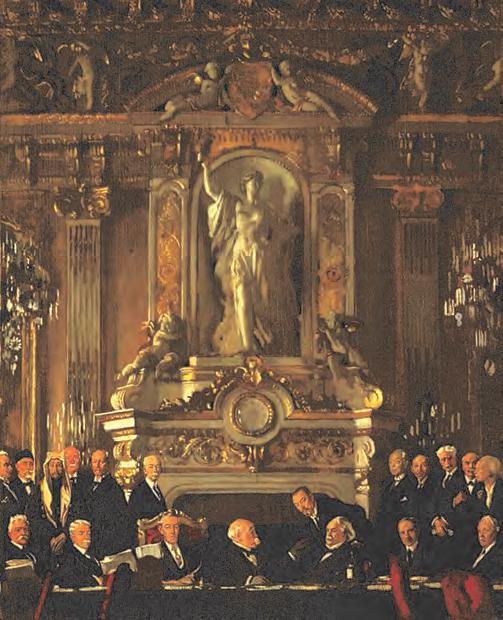
Many (especially the Germans themselves) believed that the conditions imposed on Germany were unfair. Many also believed that this was a factor in the rise of the Nazis that resulted in World War Two.
The Treaty of Sèvres – the Dismemberment of the Ottoman Empire
The Treaty of Sèvres disbanded the Ottoman Turkish Empire and required it to surrender title to all territory outside Turkey itself.
International Insert October 2022
A painting of the Arab delegation presenting its case at the Paris Peace Conference on 6 February 1919. Emir Feisal is standing near the left, US President Woodrow Wilson is seated second from the left, British PM David Lloyd George is second to his right and Arthur Balfour is seated extreme right. | Photo: Imperial War Museum.
Colonel Richard Kemp in the Quai D’Orsay presenting Episode 4 of Whose Land? The same room that hosted the Paris Peace Conference in 1919.
Continued on page 4
Lessons for Life
- Facing Change, not with Fear but with Faith (part 2)
Keith Buxtonn
Former National Director of Bridges for Peace Australia
There are seasons in life when God clearly calls us to make a specific change in our circumstances, to move to a new location, maybe to head in an altogether new direction, and at such times we will be helped by turning to His Word.
This second part of a 3-part series on ‘lessons for life’ continues our exploration of the Torah portion ‘Sh’lach’ or ‘Sh’lach Lecha’, the familiar story in Numbers 13-15 of the mission of the spies sent by Moses to scout out the land of Canaan as a future home for the Israelite people. Big changes lay ahead!
As the familiar saying goes, constant change is here to stay—we cannot avoid changes. And when we are faced with change we are invariably confronted with challenges. One of the particular challenges that this story presents us with is the need for us to deal personally with the fear that so often accompanies the inevitability of change. Fear can be a crippling thing. I am not talking about ‘the fear of the Lord’ that is described in the Scriptures as ‘the beginning of wisdom.’ That fear is related to the Hebrew word yirah and is usually understood to mean ‘awe.’
The Biblical ‘fear of the Lord’, this ‘awe’, means that we can approach God’s throne with boldness and confidence, but with a trembling awareness of the power and majesty of the One who sits upon the throne.
The fear that enveloped the Israelites in the wilderness on hearing the negative report of the 10 spies was fear of a totally different kind. This kind of fear could be defined as F.E.A.R.—False Evidence Appearing Real. It’s been described as the darkroom where the devil takes you to develop your negatives.
Writes Christian author and speaker Danni Synot: “Do you make excuses out of fear? We all make excuses when we want to get out of something we don’t want to do, and our reasons for not wanting to do something vary. Sometimes it’s a good and valid excuse, for example, we feel like we’re being asked to compromise our values, but often it’s because we have an underlying fear.”
The Israelites were gripped by a fear that emanated from a refusal to believe in the promises of a good and strong God. They chose instead to focus on the enormity of the very real obstacles before them.
Fear itself isn’t necessarily wrong, especially when you’re faced with seemingly overwhelming challenges. But what is wrong is dealing with personal fears in a self-focused way. You can’t hide from your fears and simply hope they will go away.
In an old Charlie Chaplin film there is a scene in which he is captured in battle, and attached to his leg is a ball and chain. The heavy ball keeps him from escaping and it is too securely fastened to be pried off. So with no one looking he digs a hole and buries the ball, covering it up so that it is no longer visible. With the ball completely covered, he turns to leave, only to fall flat on his face.
The thing that contributes the most to fear in our Christian walk is that we are inclined to measure obstacles and challenges against our own strength and resources instead of focusing on God’s power, resources and promises.
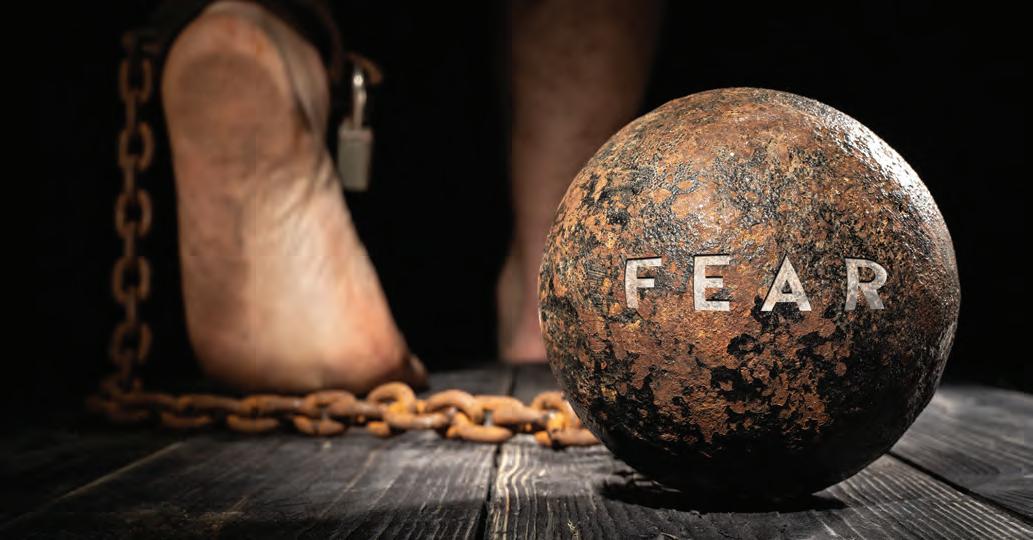
How many people do you know who have projected a strong and confident exterior, only to tremble inside with fear? We tackle our anxieties in countless different ways.
We accumulate and seek to build our security on money and things. We want to be popular with others and for them to think well of us. Asks American author Max Lucado—“Can money, possessions or popularity really deliver us from our fears?
“If power could, then Joseph Stalin should have been fearless. Instead, this notorious Soviet Russian leader was scared stiff to go to bed. He had seven different
bedrooms. Each bedroom could be locked as tightly as a safe. In order to foil any would-be assassins, he slept in a different bedroom each night.
“Five chauffeur-driven limousines transported him wherever he went, each with curtains closed so that no one would know which one contained Stalin. So deep were his fears that he employed a servant whose sole task was to monitor and protect his tea bags!
“If having possessions could overcome fear, the late billionaire Howard Hughes would have been totally fearless. Maybe you know his story. His distrust of people and his paranoia of germs led this sad man to Mexico, where he died a lonely death as a miserably unhappy and haggard hermit with a waist-length beard and corkscrew fingernails.
“What about popularity? Beatle John Lennon’s fame as a singer, songwriter, and music/pop idol made him a household word, but his fears brought him a pile of misery to add to his pile of money. His biographers describe him as a frightened man, unwilling to sleep with the lights off, and afraid to touch anything because of its filth.”
Very recently Ukrainian psychiatrist Roman Kechur wrote about Russian president Vladimir Putin: “He sits at a long table, afraid that he will be poisoned, lives in a bunker, his food is prepared by special chefs. Putin shows obvious signs of paranoia. A person who is scared of everyone experiences a very strong fear. He is afraid of losing control. He is afraid that he will be dominated, that he will be irradiated or poisoned. He lives in fear.”
Though Stalin, Hughes, Lennon and Putin are extreme cases, their examples make a powerful point. We cannot deal with our fears through paranoid behaviour, or by turning inward to our own invariably limited resources or to what the world so freely and seductively offers.
For the Israelites, the fear of giants and fortified cities outweighed the blessing of the fruit that they saw. Numbers 13:32 says they began to see the land of milk and honey as “a land that devours its inhabitants.” Some turnaround!
The Israelites saw themselves as grasshoppers in the eyes of the giants, where instead they should have seen the giants as grasshoppers in the eyes of God. The important question is not, “How big is the problem?” or “How big am I?”—but “How big is my God?”
As David was being pursued by King Saul He cried out to God in Psalm 27:1—“The Lord is my light and salvation, whom shall I fear? The Lord is the strength of my life, of whom shall I be afraid?”
In Psalm 27:4-5 he longs “that I may dwell in the house of the Lord all the days of my life... for in the time of trouble, He shall hide me in His pavilion; in the secret
place of His tabernacle He shall hide me; He shall set me high upon a rock.”
Paul wrote to a discouraged Timothy in 2 Timothy 1:7— “For God has not given us a spirit of fear, but of power and of love and of a sound mind.”
My friends, when fear keeps you away from God’s leading, put on that ‘sound mind’ and remember that God is your refuge and you can do all things in Him who gives you strength.
It’s all about how you see things. At one level, we need to give the ten spies credit. They told the truth. The land was wonderful, and the people were fierce and intimidating.
The fortified cities were no doubt impressive.
Caleb and Joshua didn’t discount what these men said. They were the facts! They just saw things differently; they saw things from a different perspective—they factored God into the equation!
Jeremy Kagan in The Jewish Self has written—“A renowned genius once asked a student, ‘What are you watching when yousit on a hillside in the late afternoon as the colours turn from yellow to orange and red and finally darkness?’
He answered, ‘You are watching the sunset.’ The genius responded, “That is what is wrong with our age. You know full well you are not watching the sun set. You are watching the world turn.’”
Two people can look at the same yard. One sees the beautiful colours of the leaves on the tree; the other sees all the leaves on the lawn that need to be raked up.
Two people can watch it rain. One sees the dust being settled and the ground soaking up desperately needed moisture, the other sees clouds and mud. Two people can face the same challenge. One sees an opportunity; the other sees a roadblock.
Rabbi Yisroel Ciner tells about a certain Rabbi Silver who visited the Displaced Persons’ camps where Holocaust survivors were taken after the war.
He was approached by a young man who defiantly announced, “Rabbi, I will never be a religious Jew!” “What makes you say that?” asked Rabbi Silver. “I saw something in the camp that I will never forget”, he explained.
“There was a man who called himself religious who had smuggled a siddur (prayer book) into the camp. It was the only siddur in our group and a few people wanted to borrow it in order to pray. He agreed to lend it but only on one condition—in return for half a day’s bread!
“And what happened?” asked Rabbi Silver curiously.
“Many gave their bread so that they could use the siddur!” he answered angrily.
Theology2 (INTERNATIONAL) October 2022 | Israel & Christians Today Tishrei - Cheshvan 5783
| Photo: Shutterstock
Continued on page 3
Israel
Continued from page 2 Lessons for Life - Facing Change, not with Fear but with Faith (part 2)
“There was a man who called himself religious who had smuggled a siddur (prayer book) into the camp. It was the only siddur in our group and a few people wanted to borrow it in order to pray. He agreed to lend it but only on one condition—in return for half a day’s bread!
“And what happened?” asked Rabbi Silver curiously. “Many gave their bread so that they could use the siddur!” he answered angrily. “I want nothing to do with a religion where the people use the religion to rob starving people of their bread!”
Rabbi Silver smiled at the young man and said: “Why do you concentrate on that one individual who had the siddur and made such a demand? Why don’t you instead look at the devotion of all of those people who gave up their bread just to pray in that siddur.”
It’s not what happens but how we view it. The sin of the spies was the worship of self—believing that they saw all
there was to see, and that their version of the truth was the only version that was true.
The ten pessimistic spies “gave the children of Israel a bad report of the land which they had spied out” (Numbers 13:32). Writing in OzTorah, Rabbi Dr Raymond Apple, for many years one of Australia’s highest profile Orthodox rabbis and its leading rabbinic spokesman, gives this a very modern and pertinent twist.
“What a shame it is that people are still doing the same thing these days,” he says. “There are more than enough negative and distorted reports of Israel in the world media, in the academic unions, among the general nonJewish public.
“Unfortunately there are also some Jews who cannot say a good word about Israel. Not just about the security dangers when bombs and missiles are constantly lobbed into Israeli homes and cities, not just when Israel is accused of denying fuel to the Gaza Strip and yet the Gazans who complain are the ones who disrupt the supplies,... not just when Palestinians seem to prefer hurting their own people and
not creating the infrastructure for independent living, but failing to see the quality of the nation and the culture that have been built in Zion and the inspiration they represent for Jews everywhere.”
Faced with the challenges of change, the ten spies brought back a bad report and the people listened to them and were paralysed with fear. They trusted human eyes—the eyes of the ten spies—instead of trusting God. God did an incredible job at creating our eyes, but He never intended that we would trust our eyes more than we would trust our God. Maybe that’s why we can’t see around corners!
You never know what may be around the corner—so (in the words of Proverbs 3:5-6), “Trust in the Lord with all your heart, and lean not on your own understanding; in all your ways acknowledge Him, and He shall direct your paths.”
Keith Buxton is an ordained pastor. He currently serves on the Christians for Israel Australia management committee and is a liaison with Christians for Israel Oceania Island affiliates.
Partition - the Idea of Two States
Andrew Tuckern
Director | The Hague Initiative for International Cooperation (thinc.) | www.thinc.info
In 1920 the League of Nations approved the Mandate for Palestine. The idea was to enable the Jewish people to re-establish their homeland ‘in Palestine’. The territory of Palestine was one area, comprising what is today Israel, the West Bank and Jordan.
The idea of dividing Palestine into two states - one Jewish, the other Arab - is not new. Time and again over the last century, as conflict and violence between Jews and Arabs has erupted, the international community has proposed division of the land into two independent states.
The first manifestation of this principle was the creation of Transjordan in 1921: a Jew-free state for the Arab Palestinians.
Division of the remaining Mandate territory (west of the Jordan River) was discussed intensively already in the period of the Mandate for Palestine, as the British sought to reconcile competing Jewish and Arab Palestinian interests. Partition was the model proposed and adopted by the UN General Assembly in the UN Partition Plan in 1947, which was reluctantly accepted by the Jewish leadership, but rejected by the Arabs.
After its creation in 1948, the young State of Israel faced three wars of aggression launched by various alliances of its Arab neighbors, each intended to destroy the new Jewish State (the 1948/9 War of Independence, the 1967 Six Day War, and the 1973 Yom Kippur War).
In the mid-1970s, the idea of two states was again revived by the international community.
In the meantime, Israel proceeded to negotiate and ultimately reach peace treaties with two of the Arab aggressor states: Egypt (1979) and Jordan (1994). The others, including Israel’s two other immediate neighbors (Lebanon and Syria), do not even recognize Israel’s existence, and remain in a state of hostile belligerency.
In 1991 the US-Soviet sponsored Madrid conference called for Israeli-Arab peace based on the territory-forpeace principle. Within the next few years, Israel and the PLO entered into a series of agreements intended to lead to Palestinian autonomy and a permanent agreed resolution of the conflict. These ‘Oslo’ agreements established the Palestinian Authority and other institutions. The West Bank was divided into Areas A, B and C, and Israel withdrew in part. Key issues such as ‘borders’ and ‘security’ were left for further negotiation.
Since 1980, the European Union has been pushing hard for a ‘two-state’ solution to this conflict. According to the EU, the creation of a Palestinian state within the ‘1967 lines’ is the only way to solve this conflict, and thus to bring peace to the Middle East.
While in the 1980s-1990s there was wide support for the idea of establishing an independent Palestinian state adjacent to Israel, public opinion has shifted significantly over the decades. The failure of the Camp David negotiations in 2000 followed by the Second Intifada was a watershed.
Today there is very little support - either in Israel or within Palestinian society - for a two-state solution.
Recognizing that a full-fledged Palestinian state is unrealistic and perhaps even undesirable, commentators and actors across the political spectrum, both in Israel and Palestinian society, are discussing alternative solutions to the conflict. These include the creation of one ‘unitary’ state between the Mediterranean and the Jordan River, to replace the current State of Israel and administered territories. Such a state could be either binational, ‘Jewish’, ‘Palestinian’, or nationless. Other alternatives that are discussed include a federation, a confederation, and a Jewish state containing a territory on which Palestinians would have limited autonomy.
The current Two-State Policy advanced by the European Union and others is based on three main assumptions:
a) That the PLO would agree to the establishment of a Palestinian State within the 1967 lines as a final resolution of the conflict;
b) That the Palestinian people, represented by the PLO, are entitled under international law to the establishment of an independent state, and Israel is obliged to enable the creation of such a state; and
c) That the legal and political culture of Arab Palestinian society in particular, and the region in general, supports the establishment of a peaceful state in Palestine based
on the rule of law.
| Photo: Shutterstock
In our view each of these assumptions is currently questionable:
First, the core issue of the conflict is not Palestinian statehood, but the right of the Jewish people to nationhood and statehood in the land. The IsraelPalestinian conflict today is essentially the same as the conflict that began when the foundations for a Jewish State were laid in the Mandate for Palestine, implementing the Balfour Declaration. The core issue in dispute is: does the Jewish State of Israel have a right to exist as a Jewish State? The PLO has always denied the right of the Jewish people to exist, and there is no sign that this will change.
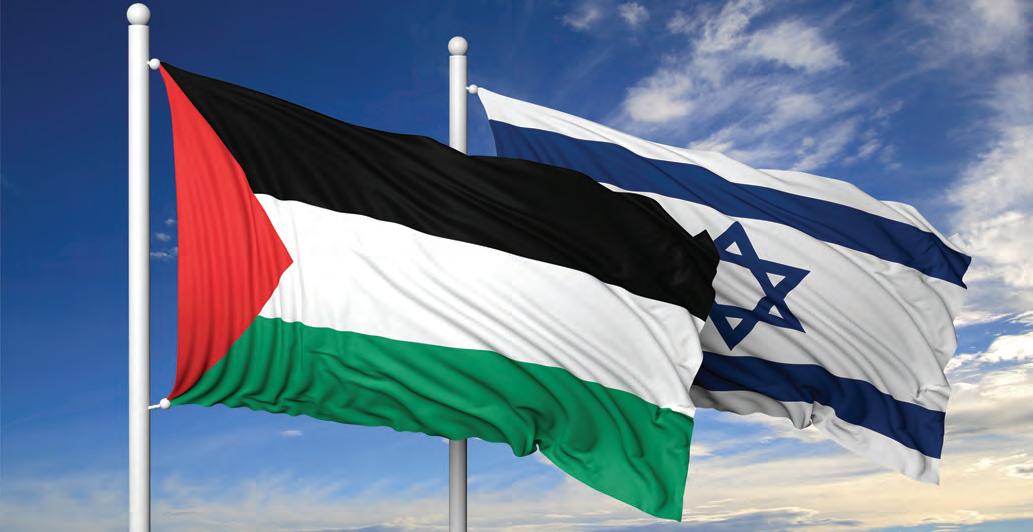
Second, international law does not mandate the establishment of a full-fledged Palestinian state within the ‘1967 lines’. The Palestinians have a right to selfdetermination, but this is not an automatic right to statehood. Moreover, the 1949 Armistice Lines have never been accepted as borders of the State of Israel. The only way for Palestinian self-determination to be fulfilled is through negotiation with the State of Israel.
Third, an examination of the dynamics, powers and legal and political culture in the Middle East, as well as the Palestinian society, suggests that there are significant cultural and structural impediments to the creation and stable development of Western-style states in the region.
These impediments are insufficiently acknowledged or addressed by the EU’s policies and programs supporting Palestinian statehood. The result is that, while some Palestinian institutions of government have been established, these are little more than an empty shell.
3 (INTERNATIONAL) October 2022 | Israel & Christians Today Tishrei - Cheshvan 5783
Political
Blessings from Fiji
Raphael Jordann
Christians for Israel Fiji

Bula and shalom from the Fiji Islands.
I hope this article will find its right place in your heart to give you comfort in our walk with the Maker of Heaven and Earth (Genesis 1:1).
Christians for Israel Fiji continues to conduct its fortnightly prayer meetings in Suva. The eagerness and urgency to come together as a group and remember the State of Israel has never dampened our spiritual walk because Israel has always been exciting and a light to the nations (Isaiah 49:6).
In this article I am sharing the pen with a special guest, who fully supports the vision and mission of Christians for Israel International. I hope we will all be blessed. I invite us all to keep her in our prayers. This is her story...
The Desire to Recognise Jerusalem as the Eternal and Undivided Capital City of the State of Israel, from the ends of the earth

My name is Ana Rokomokoti. I’m a Christian who loves Israel. I’m a Fijian citizen who is a candidate in this year’s national elections to the Fijian Parliament. I have a strong and
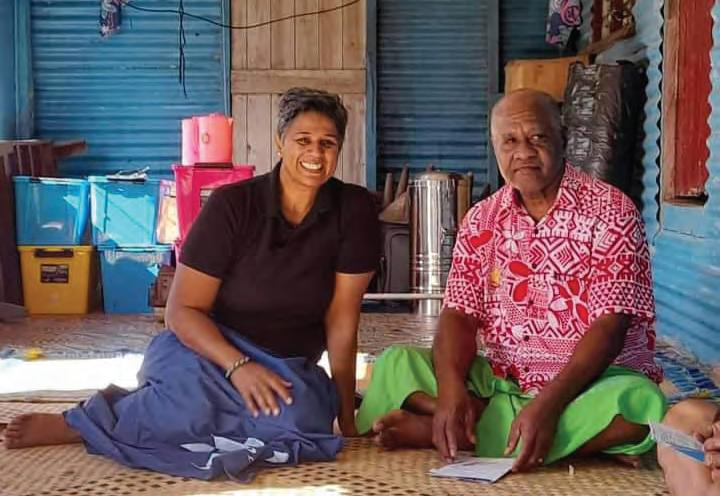
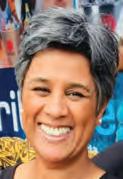
Continued from page 1 Centenary of the Mandate for Palestine: Part 2 - The Paris Peace Conference of 1919
The Principal Allied Powers were well aware of the genocidal policies of the Ottoman Turks towards the racial and religious minorities living within its empire. During the Great War the Turks had massacred well over a million Armenians, Syrian Copts and Maronite Christians, as well as expelling 11,000 Jews before the outbreak of the war. The Principal Allied Powers recognised that the dismembering of the Ottoman
earnest desire to witness countries from the ends of the earth, like Fiji, supporting Israel in international forums.
As with most Christians in Fiji, Israel, together with its capital Jerusalem, is close to my heart. The Bible tells us that God chose the City of Jerusalem to be the City of David, to be His City. Therefore, it seems obvious and the most natural, logical, and Biblical step to take, to regard Jerusalem as the rightful capital of Israel.

I decided to run for Parliament this year (2022) because I see an opportunity to pursue the possibilities of formalising Fiji’s position on this onerous issue. It is a Biblical burden that I bear, and I would like to contribute to Fiji’s policies at the national level.
Turkish empire was essential for the safety of its population, especially non-Turkish minorities including Christians and Jews.
The Turks later refused to ratify the Treaty of Sèvres and, in 1923, it was replaced by the Treaty of Lausanne. The Principal Allied Powers adjourned dealing with the former Ottoman Empire territories to a special conference to be held in San Remo, Italy, in April 1920.
1References: Obtained from interview with Dr Denis MacEoin in ‘Whose Land?’ quoting a letter by McMahon published in The Times, 23 July 1937.
It would be remarkable to see Fiji declare to the whole world that Jerusalem is the eternal and undivided capital of the Jewish State of Israel. Setting up a Fijian Embassy in Jerusalem would be a historic milestone. The benefits and blessings of doing the morally right thing would be many for Fiji. I am excited to be on this new journey. I am also encouraged to see that the United States of America have taken this step. I understand that Hungary, Czech Republic, Guatemala, and Honduras have followed suit.
God bless Israel and God bless Fiji.
Hugh Kitson is a documentary filmmaker who has made many films about Israel. His films about the British Mandate for Palestine include “The Forsaken Promise”—a three-part series (Hatikvah Film Trust 2006) and “Whose Land?” Part One, presented by Colonel Richard Kemp (Title Deed Media 2017)—see www.whoseland.tv. Part Two is still in production.
This article is the second in a six-part series exploring the significance of the British Mandate for Palestine for today. Part 3, ‘The San Remo Conference of 1920’, will follow.
Ana visiting the people of the Province of Bua in August, 2022. | Photos: Ana Rokomokoti
South Pacific4 (INTERNATIONAL) October 2022 | Israel & Christians Today Tishrei - Cheshvan 5783
History of the Church Believing Without Israel
Rev Cornelis Kantn
Executive Director | Christians for Israel International
How Israel disappeared from our Christian faith.
In this new series of articles, Rev. Cornelis Kant, explains how it happened that the role of Israel was seen as insignificant in the development of our Christian faith and in the history of Christian theology.
How and why did ‘replacement theology’ come into existence?
What role does Israel play in our faith and in our church life? During the centuries that lie behind us, Israel has hardly played any significant role in our Christian experience of faith. At most, Israel was the land where Jesus was born and where He lived. But for most Christians, the land of Israel was not of any significance, nor were the Jewish people. Even today, Israel is hardly relevant for many churches and in the religious experience of many Christians.
Yet Israel appears hundreds of times in both the Old and New Testaments. In the Old and New Testaments, we read a lot about the everlasting covenant between God and His people Israel.
Israel’s significance in the Bible
The prophet Zechariah says: “Sing for joy and be glad, O daughter of Zion; for behold I am coming, and I will dwell in your midst,” declares the Lord. “Many nations will join themselves to the Lord in that day and will become My people. Then I will dwell in your midst, and you will know that the Lord of hosts has sent Me to you. The Lord will possess Judah as His portion in the holy land and will again choose Jerusalem” (Zechariah 2: 10-12).
Signs of Faith
By Kees de Vreugd
The Sukkah
And in Luke 1 the angel Gabriel says to Mary: “And behold, you will conceive in your womb and bear a son, and you shall name Him Jesus. He will be great and will be called the Son of the Most High; and the Lord God will give Him the throne of His father David; and He will reign over the house of Jacob forever, and His kingdom will have no end” (Luke 1: 31-33).
These passages speak impressively about a great future for Israel.
congregation consists mainly of Jews who believe in Him. Outside Israel, it was increasingly Christians from the Gentiles who formed the first congregations. Consider the congregations in cities such as Ephesus, Laodicea, Thessalonica, Corinth, Athens and Rome. These Gentiles exchanged their lives with the Roman gods for a living relationship with Jesus Christ, inspired by the power of the Holy Spirit.
Most of those new Christians had little interest in
So how and why did Israel disappear from Christian faith and theology? Why was Israel increasingly seen as replaced by the Christian church? Gradually, Christian theologians came to the view that all the promises for Israel had transferred to the Christian church. Israel as a people and as a country disappeared from the church’s focus. Israel’s role was played out, except that the judgements were often still applied to Israel.
In this series of articles, we will try to clarify how certain passages in the Bible were gradually interpreted in a completely different way than their writers intended. And we will explore the position Israel and the Jewish people deserve when we read the many Bible passages about Israel again as they were originally intended.
Israel in the Early Church
With the Great Commission in Matthew 28, Jesus sends His apostles into the world. The Gospel is to be proclaimed worldwide. In Jerusalem, the first
similar questions. The oral Torah makes practical what is assumed in the written Torah.
In this series, ‘Signs of Faith’, objects that express Jewish faith are explained and discussed.
Four walls and a thin thatched roof… That’s all it is – that’s all it is.
Our little house is crafted swiftly; Some reeds, some nails and a bit of wood Joined together, done and dusted Lo and behold: the Sukkah is crafted!
In May 1918, Dutch teacher and poet Clara Pinkhof wrote this nursery rhyme about the Sukkah.
One time it is said in Torah: “All native-born Israelites are to live in temporary shelters for seven days” (Leviticus 23:42). The reason is provided as well: “so your descendants will know that I had the Israelites live in temporary shelters…” (Leviticus 23:43).
What is a Sukkah? What does it mean to live in the Sukkah? The oral Torah or Mishna answers these and
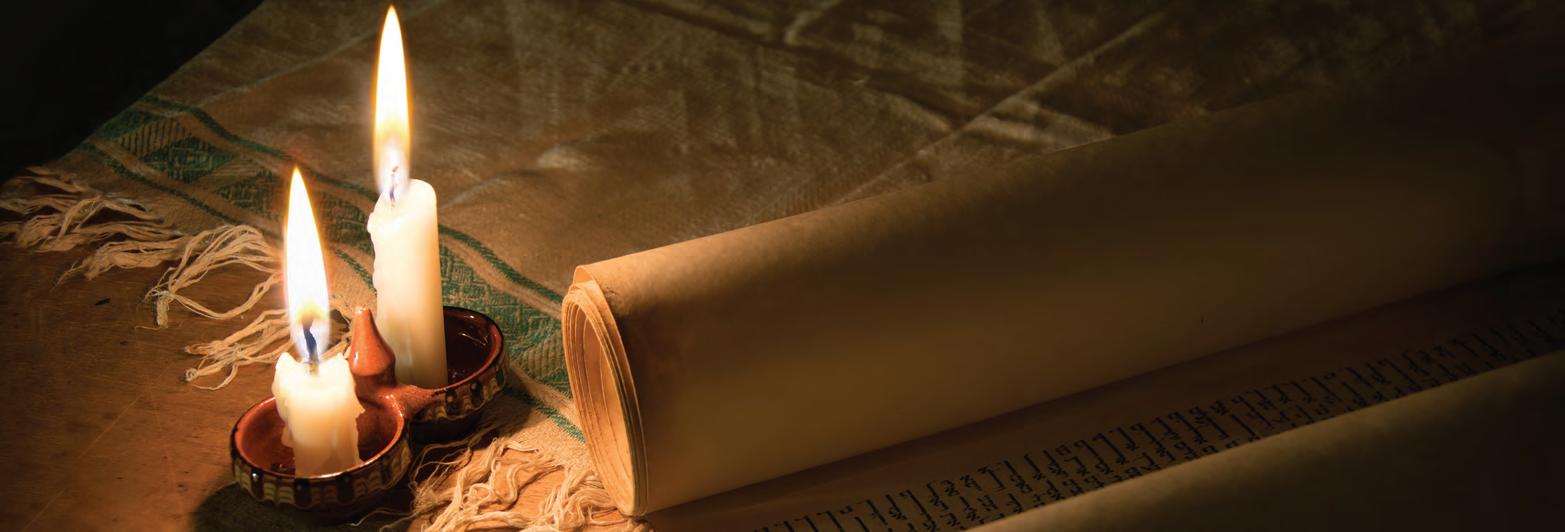
The Hebrew word ‘Sukkah’ is related to a verb that means ‘to cover’. So, what is really important is the rooftop. The Sukkah recalls living in the desert under God’s care. It is also a symbol of the transience of existence. The used materials all have a temporary quality.
The rooftop (Hebrew: Schach) is plant material, like branches, leaves or bamboo stems, but so sturdy that it will hold for a week. When is the rooftop fullyfledged? If you have more shade than sun inside the Sukkah. But through the rooftop, you must still be able to see the open sky. The Sukkah should not be under a canopy or a tree or something similar. The Sukkah must have at least two solid walls, one partial wall and a door. But mostly it is built with four walls. Contrary to the rooftop, the walls can be made of anything, like boards or canvas, provided the canvas is attached properly and doesn’t flap in the wind.
Judaism. At the same time, there were also believers with a Jewish background in the early churches who believed that these new Gentile Christians should be circumcised and live according to the Jewish law. For Jewish believers in Christ it was a shock to discover that God would create a people for Himself outside the Jewish people and outside Jewish life. Hence, in Paul's letters, there were often discussions about circumcision. Gradually, a distance grew inside the congregations between the believers from the Gentiles and the Jewish believers in Christ. The Jews were not well regarded in the Roman Empire anyway, because they were seen as a rebellious and stubborn people. This had everything to do with the fact that Jews did not want to adapt to the Roman religion but wanted to continue their own worship to God in the temple according to the guidelines of the Old Testament. And so a chasm developed between Jewish and Gentile believers in Jesus.
It is customary to start the preparations for building the Sukkah immediately after the conclusion of Yom Kippur. There are ready-made kits available. But it is much more fun to collect the materials yourself as a family.

9
| Photo: Shutterstock
October 2022 | Israel & Christians Today Tishrei - Cheshvan 5783
Even today, Israel is hardly relevant for many churches and in the religious experience of many Christians.
Recommended Reading
The Israeli Solution: A One-State Plan in the Middle East
By Caroline B. Glick (Crown Forum, 2014)
All efforts over recent decades to create an agreement between Israel and the PLO resulting in an independent Palestinian state existing ‘side by side with Israel in peace and security and mutual recognition’ have failed.
Today there is very little support for a twostate solution. Commentators across the political spectrum, in Israel and Palestinian society, are discussing alternative solutions. These include the creation of one ‘unitary’ state between the Mediterranean and the Jordan River. Other alternatives that are discussed include a federation, a confederation, and a Jewish state containing a territory on which Palestinians would have a limited autonomy.
Journalist Caroline Glick’s The Israeli Solution: A One-State Plan for Peace in the Middle East fits in the latter category. She calls for Israel to annex the West Bank and to offer citizenship to Palestinians while ensuring Israel remains a Jewish state. Glick calls the two-state solution a ‘bipartisan pipe dream’. The conflict is really about the right Jews have to selfdetermination in their ancient homeland and about Israel’s right to protect itself from terrorism.
Glick does not believe Palestinians are interested in peace with Israel. The socalled peace process has failed because of insincere efforts on the part of the Palestinians who continue to teach their children to hate ‘God’s chosen people.’
Glick believes anti-Israeli violence is not rooted in the occupation but in Palestinian opposition to Israel’s existence and anti-Semitism.
Biblical Roots
By David Nekrutman
The Giving of the Torah
Johannes Gerloffn Theologian, Journalist, Lecturer & Author
This is part seven in a series of articles based on the book Rejoice, You Nations, with His People, by Johannes Gerloff (due for release in 2022).
Already in the first part of his Letter to the Romans, Paul had mentioned this advantage of the Jewish people:
“To them the words of the [one and only] God were entrusted” (Romans 3:2).
Beginning with Israel’s fathers Abraham, Isaac and Jacob, then at Mount Sinai and then “in manifold and diverse ways... through the prophets” (Hebrews 1:1) God revealed Himself to the nation of Israel.
Norbert Baumert correctly emphasises:
“The giving of the Law at Mt. Sinai is a personal gift of God to Israel, by which the people came of age and became legally responsible persons”. The Torah is primarily a gift, not a demand. It is not principally meant to be a ‘fence’, limitation or even restriction, but rather liberation from the curse of chaos. The Torah sets an objective and thus is the redemption from disorientation. The psalmist confesses (Psalm 147:20): “He has not done so to any other nation”.
The Greek ‘nomothesia’ occurs only here in the New Testament. It means much more than just the content of the Torah.
Literally translated, it means ‘giving of the law’ or ‘institution of the law’. This word signifies the act of transmitting God’s instructions. God chose and empowered the people of Israel in a unique way, in order to give ‘the imperishable light’ of the Torah to the world through them. All the writings of the Bible including the
Sermon on the Mount: Jesus as Legal Decider
When I first read the expression, “You have heard it said…, but I say to you…” within the Sermon on the Mount in my Jewish-Christian relational training at the Israeli Consulate in New York 21 years ago, I immediately connected the expression to a famous teaching within Judaism that dates sometime between 410 BCE and 310 BCE:
The Men of the Great Assembly said three maxims: Be measured in the legal process', raise up many disciples, make a fence for the Torah.
Understanding the power and attraction of sin, these sages, which included Ezra, Malachi, and Mordechai, began to introduce a network of institutional directives to prevent the nation from violating the biblical commandments. The basis of institutional directives can be inferred from the Nazarite text in Numbers 6:121. Although the vow is to distance oneself from the intoxicating beverage of wine, the Bible prevents the Nazarite from eating raisins or tasting vinegar.
Although raisins and vinegar never get a person drunk, the possible association with these items might ignite a chain reaction which could shortly lead to drinking wine and violating this sacred oath. The idea of abstaining from raisins and vinegar was a fence. Making a fence also applied to other areas of national Jewish life and practice.
It is important to note that in the time of Jesus, the Tanakh (Old Testament) was the only Bible.
Furthermore, besides the Essenes and Sadducees,
New Testament were authored by Jews.
Over the centuries, the Jewish people kept the Hebrew language – the ‘tongue of the prophets’ – alive. Because of that fact, they have a much more immediate and living access to God’s word. In the field of interpreting Scripture, we, as non-Jews, can learn a lot from the Jewish people.
Maybe there is a spark of truth in the explanation of Exodus 24:12 as transmitted by the Babylonian Talmud (Berachot 5a).
There, Rabbi Levi bar Hama says in the name of Rabbi Simeon ben Lakish: “What is the meaning of the verse: ‘And I will give thee the tables of stone, and the law and the commandment, which I have written that thou mayest teach them’? –the ‘Tables of stone’ are the Ten Commandments; ‘the Torah’ refers to the Pentateuch; ‘the commandment’ refers to the Mishnah; ‘which I have written’ refer to the Prophets and the Hagiographa; ‘that thou mayest teach them’ refers to the Gemara. It teaches [us] that all these things were given to Moses on Sinai”. Part of the nomothesia, the giving of
there were many Pharisaic and other Jewish movements during the time of Jesus. Judaism was not a monolith during the end of the Second Temple period. Therefore, the expression “you have heard it said…, but I say to you…” is Jesus acting as legal and ethical decider for his followers in a time when different schools of Judaism were expounding on Jewish law and ethics.
To highlight the above idea, let's address the topic of the justifiable grounds for divorce. While the biblical source for divorce is contained in four verses in Deuteronomy (24:1-4). The justifiable grounds for separation is how one interprets Deuteronomy 24:1 which states, “If a man takes a wife and is intimate with her, and she becomes unfavorable to him because he discovers in her an unseemly matter (ervah davar)…” Focusing on the expression of ervah, the term’s association with sexual immorality (Leviticus 18), the House of Shammai says divorce is only allowed when infidelity is suspected. However, the House of Hillel honed in on the term ‘davar’ and permitted divorce even in a case as trivial as a wife burning dinner. However, Rabbi Akiva focuses upon the earlier part of the verse, “she becomes unfavorable to him,” as separate grounds for divorce. Even if she has done nothing wrong, he may divorce her if he desires another woman.
The Bible allows divorce, but it is unclear as to the justifiable grounds for it. The rabbis are also aware of the tragedy of a failed marriage where even the altar in the Temple sheds a tear. When governing a nation in times when spouses may not be living the most
| Photo: Shutterstock
Torah, is the historic timing, the cultural environment and the geographical location of the revelation of the word and character of God. All of this is inseparably connected to the Jewish people.

If the explanation of the Torah belongs to the Israelites, it would be good for us ‘believers from the Gentile nations’, “to sit under the fig tree” (see John 1:48) – which in the Bible is also a picture for the Jewish people – and listen to our Jewish friends with an attitude of learning, instead of ‘hovering above it’ in a know-it-all, selfopinionated way. After all, it is written even about our future that instruction shall go forth from Zion, “and the word of the Lord from Jerusalem” (Isaiah 2:3).
Jesus said in Matthew 23:2-3: “In the seat of Moses sit the scribes and Pharisees. Everything they tell you practice and preserve”.
Perhaps the Apostle Paul only wanted to reiterate and underline these words of Messiah Yeshua by emphasising that the transmission of God’s Torah belongs to the Israelites?
exemplary life of Torah and commitment to the sacredness of the covenant of the marriage bond, the question remains on how to properly legislate. In the mainstream of Second Temple Jewish governance, divorce was allowed beyond suspicions of infidelity. However, to protect the covenantal bond of marriage and for his followers to live to a higher standard, Jesus enacts a fence around the Torah (Matthew 5:3132). He does not abolish divorce, rather Jesus, within the context of Jewish law, follows within the contours of the House of Shammai and allows divorce when there is suspicion of infidelity.
Matthew 5-7 did not take place in one day at one setting. The author of Matthew is presenting the greatest hits of Jesus’ teachings in the Sermon on the Mount as well as an introduction into the Gospel message. However, to grasp the Sermon on the Mount teachings, in high definition, one must hear as first century Jews heard within the Judaisms of the day, the geographic location, and cultural mindset. Therefore, I conclude when reading the, "You have heard it said…, but I say to you…," a bracket should be added for Jewish legal and ethical context:
"You have heard it said [in the discussions of this subject within different Jewish movements] …, but I say to you [as legal (or ethical) decider]…"
David Nekrutman is an Orthodox Jewish Theologian involved in the sacred calling of Jewish-Christian relations for over two decades and currently serves as the Israel Director for The Isaiah Projects. In 2018, Mr. Nekrutman received his master's in biblical literature from Oral Roberts University.
10 Theology
October 2022 | Israel & Christians Today Tishrei - Cheshvan 5783
Winning the War on Truth - Part 2
Short News
IDF Base Guards Torah Scrolls
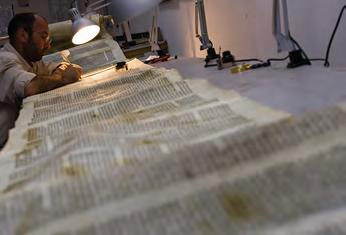 | Photo: Shutterstock
Kameel Majdalin
Director | Teach All Nations Inc.
| Photo: Shutterstock
Kameel Majdalin
Director | Teach All Nations Inc.
In Part 1, we learned that there is a war going on against the truth - God’s truth. You cannot win a war until you know you are in one. We learned some of the aspects of deception out there today: disinformation, misinformation, gaslighting, post-truth, etc.
The war on truth was prophesied. In Part 2, we focus on what the Bible says about this war.
The Bible Says
Let’s face it, we have never seen such a concerted attack on truth - absolute truth - God’s truth. Yet it should not be a surprise to students of the Bible. If we are in the last days - and we are (1 John 2:18) - then one of the most fundamental signs is that deception will be manufactured and disseminated on an industrial scale.
Jesus’ warned His inner circle “Take heed that no man deceive you” (Matthew 24:4). This is a divine command. Deception does not merely distract and divert people from the right path - it can be utterly destructive. That’s why it is to be recognised, repudiated, and avoided.
How do you avoid following the ‘fake Christs,’ while seeking the real One? Become very familiar with the Jesus of the Bible: Son of David, Son of God, Saviour. Just as ancient heresies presented a distorted picture of Christ, we have some bad ones todayeverything from the ‘all love-no judgement’ sentimental Jesus, the ‘love is love’ Jesus; the ‘social justice Jesus;’ ‘New Age Jesus;’ and ‘life-coach Jesus.’
Three Types of People
In a related warning, 1 Thessalonians 5:7-8 speak of three types of ‘last days’ people. These include:
1. Sleepers: These people are awake to the things of this fallen world and its carnality, yet they are fast asleep to the things of God. Until they are born again, they cannot see the Kingdom of God (John 3:3).
2. Drunkards: This is far more than overindulgence in alcohol. Last days ‘drunkards’ live in deception, delusion, denial, and escapism (including life-controlling substances). Both sleepers and drunkards will be totally caught off guard when the day of the Lord comes as a thief in the night and there is no escape (1 Thessalonians 5:2-3).
3. Children of the light and of the day (1 Thessalonians 5:5): These are the true followers of Jesus Christ, the light of the world (John 8:12). They understand the ‘times and the season’ and ‘know perfectly about the “day of the Lord’” (verse 1).
Watch and Be Sober
One caveat: the children of the light and day are given a simple command in verse 6: Therefore, let us not sleep, as do others; but let us watch and be sober. Now is not the time for spiritual
slumber, lethargy, or distraction - but to ‘watch’ and ‘be sober.’
The command to watch is found in Matthew 24:42, 25:13; 26:38; Mark 13:35, 37; 14:34, 37; Acts 20:31; 1 Corinthians 16:13; Colossians 4:2; 1 Thessalonians 5:6; 2 Timothy 4:5; Revelation 3:3.
The command to ‘watch and pray’ is found in Matthew 26:41; Mark 13:33; 14:38; Luke 21:36.
Are we getting the message? If we are to avoid deception and be thoroughly equipped for last days living, we need to ‘watch,’ ‘pray,’ and ‘be sober.’

Let us understand that in the last days’ war on truth, it is not that lying, and falsehood are anything new; they first appeared in the Garden of Eden! What makes last days’ deception distinctive is its size and intensity, including a spirit of strong delusion. It will be like gale-force winds. Only if you build your ‘house upon a rock’ (Matthew 7:24-25) can you keep standing.
The apostle Paul gives us a detailed prophetic warning of this in 2 Thessalonians 2:9-12:
“Even him, whose coming is after the working of Satan with all power and signs and lying wonders, and with all deceivableness of unrighteousness in them that perish; because they received not the love of the truth, that they might be saved. And for this cause God shall send them strong delusion, that they should believe a lie: That they all might be damned who believed not the truth but had pleasure in unrighteousness.”
The man of sin, son of perdition, will demonstrate satanic power through ‘signs and lying wonders.’ These do not point to the real Christ, but the ‘fake Christ,’ known also as the ‘antichrist.’ Those who sleep and are drunk will be ensnared by this wicked deception. God, in His sovereignty and wisdom, is sending a strong delusion that they will believe the lies and be condemned.
Since truth is so fundamental to building your life on a sure spiritual foundation, and the lack of it is a disaster, remember that we are personally responsible for whether we are in the truth or deceived. Yes, there is intense spiritual warfare out there today and the spirit of delusion is strong. Yet we have a choice to say ‘Yes’ or ‘No’ to the truth. We can blame Satan, like Eve did in the Garden of Eden, but God held her accountable; after all, she should have known better. Truth is readily available but you need to seek it, embrace it, and love it.
In summary, deception is very real and dangerous. A lot of fantasy, fiction, fairy tales, and falsehood is being peddled in the public square. No matter how outlandish, it is conveyed with a straight face. We must watch and be vigilant so that we don’t fall for the web of lies Deceived people choose deception due to their lack of ‘the love of the truth.’ Failure to believe the truth results in being lost. Thank God there is an antidote because God’s truth, which is found in the gospel, will always counteract the poison of deception. To be continued.
The thinking was probably: no place is as safe as an Israeli army base. More than 400 Torah scrolls are stored at an army base in Israel. Some are centuries old; others have a special story because they belonged to vanished Jewish communities. The scrolls are sacred and are therefore not displayed in a museum. The storage area at the army base is now basically a large holy ark (cabinet in which Torah scrolls are kept).
Photo: Flash90
Bird Migration Pose Flight Safety Risk
The narrow airspace of the Jewish state, sitting on the crossroads between Africa and Eurasia, is crossed twice a year by 500 million birds on one of the world's largest global migrations.
Experts at the Jewish National Fund are now warning that having birds and planes share the same flight path poses a serious safety risk to travellers. In extreme cases, a collision with a bird could lead to an engine failure.
Therefore, experts said, aviation authorities should change commercial flight routes in and out of Ben Gurion airport for the months of September and October.
Commitment to Jewish Community
Morocco made a commitment to the Jewish community in its country. The goal is to strengthen Jewish culture and historical ties and improve ties with Jews of Moroccan descent. Nowadays it is estimated to number 3,000 people, the largest in North Africa. Around 700,000 Israelis claim Moroccan descent and maintain strong ties with their country of origin.
Sharing Holocaust Archives
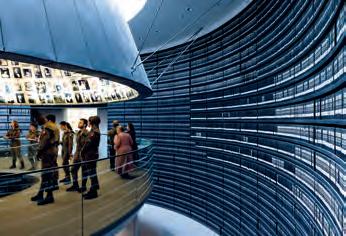
Israel and Argentina will start exchanging records from their Holocaust archives. This will give Israel access to data about Jews who fled to Argentina during the Holocaust. The countries also agreed to further develop educational programs about the Holocaust for Argentina.
Photo: Flash90
11Theology
October 2022 | Israel & Christians Today Tishrei - Cheshvan 5783
|
|
Sukkot - Feast of Tabernacles
n Rabbi I. Vorst Christians for Israel Netherlands
As a child, Rabbi Itzhak Vorst B Eng (Rotterdam 1938), survived Nazi concentration camps Westerbork and Bergen-Belsen. His father was the chief rabbi of Rotterdam. After his engineering studies, he went to Israel to help build up the city of Haifa. There, he encountered the Chabad Chassidic movement. He was sent back to the Netherlands to rebuild Jewish life there. He introduced Chabad to the Netherlands. His characteristic teachings, based on Chassidic teaching, are appreciated by Jews and many Christians alike.
To Exist or Not to Exist
Let me start with a question: do we exist or do we not exist? In Ten Sayings the world was created (Mishna Avot 5:1). God said and there was. These Divine Words and Letters, these Ten Sayings through which everything was created and through which everything we experience as a world exists, these Ten Utterings are always and still ‘within the Speaker’ and are spoken by God over and over again.
In Jewish thinking, this means that we are a manifestation of God ‘within God’, without perceiving it – without being able to perceive it. “For no man can see Me and live” (Shemot – Exodus 33:20).
Or in other words: we exist, but in a different kind of existence, an existence that is not our own. With these words God manifested Himself at the Sinai revelation: “Anochi Hashem Ellokeicha - I, the Lord (the Divine fourletter Name that Jews do not pronounce) – elevated above Time and Space – am your God in Time and Space.”
Something of God’s concealment in relation to the world was lifted. And so King David could declare - and so it is said or sung before the reading of the Torah in the synagogue: “Lecha Hashem hagedulah”. You reveal Yourself in Greatness, Power, Glory, Victory and Honour; to You belong all that is in heaven and on earth. You manifest Yourself in Your Kingship” (1 Chronicles 29:11; Psalm 99:5 and 9).
These are the Seven Divine attributes or properties that God has ‘given’ Himself, to create, maintain, lead, judge the world with.
Seven Divine attributes. Seven is therefore a holy number, to be found in the worldwide seven-day week and in the Torah cycles of seven years (Sabbatical year) and seven times seven years (Jubilee year), in the seven days of Pesach, in the seven weeks towards the Feast of
Dependency
This brings us to the seven days of Sukkot, the Feast of Tabernacles. On the last day of this seven-day feast, seven circumambulations are made in the shul (synagogue). On the last day of this seven-day feast, seven circumambulations are made in the shul-room, whereby each time one of the above mentioned Divine Attributes is proclaimed.
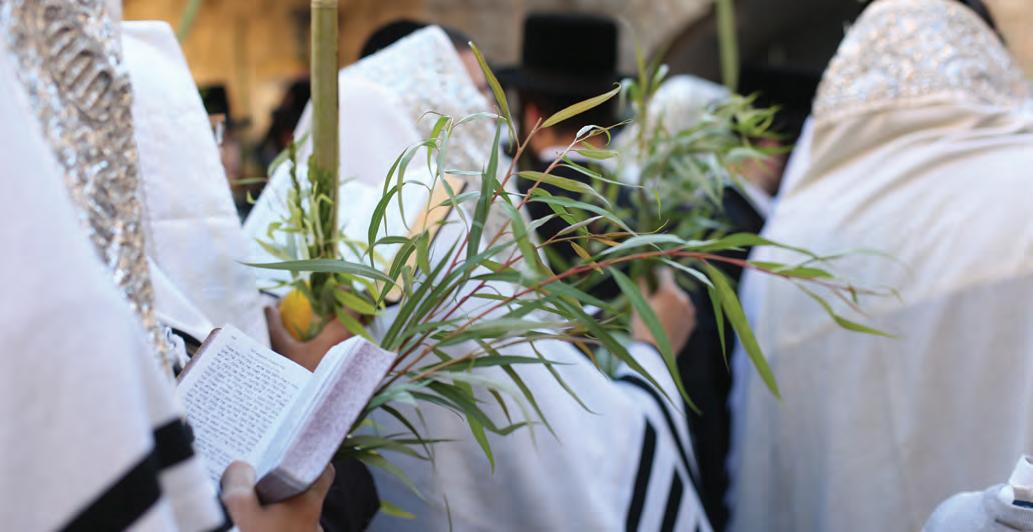
Seven days of Sukkot is first of all seven days of staying in the sukkah. This is usually a less sturdy structure, with a leafy roof, through which you should be able to see the stars at night. This is to become aware that the world is not a solid building in itself. The world is a hidden manifestation of God and therefore we remain completely dependent of God.
Four Kinds
In what way do we also experience our dependence on God? In what way can we feel that we literally need God as bread?
By holding four different kinds of plant material with our hands. The lulav palm branch, the etrog-citrus fruit, the three myrtle branches and the two willow branches. All of them vegetative; for the rainy season is about to begin, we hope, with God’s help in the land of Israel. Only with God’s Help. Everything vegetative needs this rain and
needs therefore God’s help. Of course, in Israel you feel this more strongly than in the Diaspora.
Plus in Israel this dependence on God is experienced extra strongly during this Sukkot harvest festival in the realisation that the right to the land is not based on the decision of the UN in 1947, but in essence only on God’s decision to give Erets Yisrael to the Jewish people forever.
The fact that God is everywhere – He is, after all, the only Real Existence – is expressed by moving the Four Species in all six directions; horizontally and vertically, forwards, to the right, backwards, to the left, upwards and downwards.
Intense Joy
Feeling this dependence on God, experiencing it, brings joy, intense joy. Z’man Simchateinu - Time of our Joy is the appropriate name for these days. Including the following days of the Closing Feast. Then, on the day of Simchat Torah - Joy of the Law, seven circumambulations are made in the shul again. Dancing, with the Torah scrolls in their arms!
On that day the Torah is read out, after which the reading of Bereshit-Genesis is started immediately. This is a kind of circumambulation in itself.
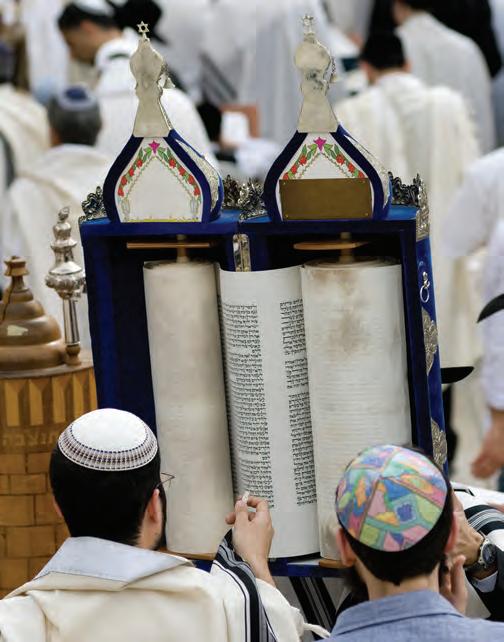
The series of special days, started with Rosh Hashanah, is thus ended in joy, relieved and recharged as we are for the coming dark days of autumn and winter.
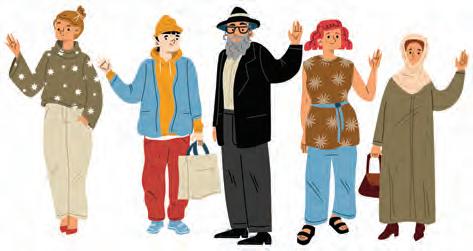 Weeks Shavu’ot. And so on.
Weeks Shavu’ot. And so on.
12 Biblical Reflection
Orthodox Jewish men pray in front of the Western Wall on the holiday of Sukkot. | Photo: Shutterstock
October 2022 | Israel & Christians Today Tishrei - Cheshvan 5783 Facts Speak
|
Photo: Shutterstock
The Population of Israel 9,449 million people Growth of 1.7% compared to previous year 184,000 babies born 27,057 new olim (immigrants) 93.2% of the population of Israel is urban Source: Central Bureau of Statistics; December 2021.
Germany Makes Amends for Munich
Joanna Mossn Christians for Israel New Zealand | Contributor
As the 50th anniversary of the 1972 Munich Olympic massacre loomed, Germany desired to make amends. However, there was a major sticking point. The victims’ families who were seeking a proper apology, answers and adequate compensation, were planning to boycott. Time was running out, making the event untenable.
Spokeswoman Ankie Spitzer, widow of Andre Spitzer, who, along with Ilana Romano, has devoted her life to seeking justice, wrote, “50 years of insults, lies, humiliation and rejection by the German government, and especially the Bavarian authorities are more than enough”. Israeli President Hertzog was given the difficult task of brokering a deal before the anniversary to ensure participation. Ironically, around the same time PA President Mahmoud Abbas came to Germany and declared that Palestinians had suffered 50 holocausts. This was far too much for Germany to stomach as holocaust remembrance is a delicate matter.
Olympic Hostage Recap
The Munich Olympics opened in West Germany on 26 August 1972 with 7,173 athletes from 121 countries. It was supposed to be the cheerful, peaceful games of a new Germany drawing a line under the Nazi, military precision of the 1936 Berlin Olympics where Hitler and racism dominated. Security was light and being only 27 years after WW2 ended, Germany didn’t have much of an army nor a developed police force used to coping with security incidents. Munich was a provincial city coming of age.
The Israeli team of twenty-two athletes included Shaul Ladany, a survivor of Bergen Belsen. It was comprised of weightlifters, wrestlers, fencers, sharpshooters, sailors and track athletes; some of whom had been born in Europe. For many Israelis, the return to Germany was a victory over the Nazis all over again and they were proud to see their distinctive blue and white flag paraded in front of the world to cheers from the crowd. Here was this fledgling Jewish state that had arisen out of the ashes sporting Olympic athletes.
On the evening of the 4 September the Israeli team had attended Fiddler on the Roof. Here was the new Germany staging a Jewish masterpiece. Little did they know that in a matter of a few hours, the plight of European Jewry was to be revisited upon them.
At 4.30am eight gunman disguised as athletes entered the compound where the Israeli team was housed. They were members of the Black September group. They first entered the room housing team coaches and officials, including wrestling referee Yossef Gutfreund, who barricaded the door. Next, wrestling coach Moshe Weinberg was attacked and the terrorists took additional wrestlers and weightlifters hostage, nine in total.
Weightlifter Yossef Romano was the first to die followed by Weinberg. Both bodies were left bleeding beside the hostages, then eventually tossed outside for all to see. To avoid detection, Ladany climbed along the rear balconies to Apartment 5, where Chef deMission Shmuel Lalkin lay and raised the alarm. Others hid escaping later.
Terrorist Demands
The hostage takers demanded the release of 234 primarily Palestinians jailed in Israel and two in West Germany. PM Golda Meir poignantly remarked that they were killing Jews in Germany again. She refused to give in to the terrorist demands citing that to do so would endanger Israelis worldwide. Then began the negotiations by West German authorities who offered the terrorists huge sums of money and substitutions of high-ranking Germans to release the hostages, but the offers were refused. Fencing coach Andre Spitzer spoke fluent German and was used in the negotiations.
After a failed ambush, the terrorists and hostages were transported by helicopter to a Munich airfield where many more errors occurred that led to the demise of the rest of the hostages and some of their captors plus a German policeman. What followed were moments of intense grief and disarray.
Ÿ
Relevant Factors
Ÿ
Israeli Chef de Mission Shmuel Lalkin had expressed concerns to Germany about the housing of the Israeli team and positioning by a gate. He was told extra security would be provided. No evidence suggests this was done.
In preparation, Olympic organisers had asked German forensic psychologist Georg Sieber to create 26 terrorism scenarios in advance. One of which accurately forecasted what was to follow, highlighting that the authorities should have been prepared.
Ÿ Israel offered to send a Special Operations team, but the Germans refused. The former Israeli intelligence head, Zvi Zamir, concluded the German police “didn’t make even a minimal effort to save human lives.”
Ÿ In 2012 German newspaper, Der Spiegel, contained a reference that the German authorities received a tip off from a Beirut informant weeks prior to the event.
Ÿ
Paradoxically, filming by international media allowed the terrorists to watch the West German police take up position via their TV screens. None had terrorist experience.
Ÿ
Many aspects of the ambush were bungled including not acting on updated information on the number of terrorists, failure of gear and personnel to arrive, poor planning, insufficient staffing, inadequate equipment and poor execution. There is even a suggestion that some of the hostages were shot inadvertently by the Germans.
Ÿ
Official reports suggested the hostages had been rescued, adding to the grief.
Ÿ
Following public criticism of the Olympic Committee’s actions, a memorial service was held with 80,000 spectators and 3,000 athletes. Yet the IOC President made very little mention of the murdered Israelis, saying the Games must go on, adding insult to injury.

Ÿ
The terrorists were never brought to justice and no inquiry was ever held, yet it was then the worst terrorist event in West Germany’s history with possible links to far-right German groups.
Ÿ
The terrorists were handed over within a few months and a large sum paid.
Ÿ
Whereas paltry compensation sums had been paid to the families by the German government and Red Cross.
Ÿ
For 20 years Germany refused to release information, locked files away and refused to accept responsibility.
Ÿ
A tiny memorial plaque was placed outside the team’s Olympic lodgings. Only in 2016 were the athletes remembered during the Rio Olympics despite repeated requests. A proper memorial ‘the Shelter’ was only unveiled in 2017, 45 years afterwards.
Multiple Parties Affected
It was not just the families who were affected. At stake was the reputation of Germany as a democracy, the historic Shoah wrongs and its special relationship with the State of Israel. Then there are the German Jewish communities facing ongoing antisemitism. Munich and the International Olympic Committee (IOC) stand in the middle as the host of the event and the facilitator.
On the other side lie the State of Israel, surviving athletes and team members, the families of the deceased, and also the Germans involved, particularly those at Fürstenfeldbruck Air base, such as those working in the control tower, police, army or snipers, many of whom suffered ongoing nightmares and faced the same silence.
Commemoration Ceremony
At the German Memorial event on 5 September of this year at Fürstenfeldbruck Air base, German President Frank-Walter Steinmeier reflected upon the miracle of reconciliation with Israel over this matter. He issued a detailed, heart-felt apology and acknowledged the families’ lengthy pain, suffering and trauma coupled with Germany’s silence, obstruction and host responsibility.
He said that the victims’ families deserved dignity and to be heard. Then Steinmeier signaled that a joint GermanIsraeli historian taskforce will be formed to review documentation to find out what caused the catastrophic failure and investigate the many unanswered questions.
The President acknowledged that Germany had a special duty to protect the Israeli athletes after the Shoah and this made them culpable. “We wanted to be good hosts, but we were not able to live up to the trust that the Israeli sportsmen and their families placed in Germany,” he added.
In an emotive address, Israeli President Hertzog spoke of Israel’s pain and that Germany and the IOC had failed to remember the event, creating ongoing pain from indifference.
IOC’s Thomas Bach called it, “the darkest day in Olympic history” and commended Israel for continuing to participate in the Olympics despite the indifference shown.
Ankie Spitzer, who led the ongoing case for remembrance, reflected in English upon her commitment to her late husband and on Conrad Ahlers, (the German government’s representative) statement that it was “an unfortunate interruption of the Games that would be forgotten in a few weeks”. Those factors cemented her determination to go on.
Compensation
More than 28 million euros were paid in compensation, with the vast majority coming from the German government with the state of Bavaria, and a small sum from the city of Munich. The new agreement provides 1.2 million euros for each of the 23 eligible family members.
This is a far cry from compensation for international acts of terrorism which usually range from $3.5-$22 million per victim, according to the International Court of Justice in The Hague. The IOC is not involved in paying compensation. However, President Thomas Bach said the IOC will help with the investigation.
Conclusion
Ironically 50 years from the Munich massacre, the Israeli marathon team won gold at the European Athletic Championships in Munich, paralleling the marathon effort made by the widows to obtain the details of what really happened and seek compensation.
13History
October 2022 | Israel & Christians Today Tishrei - Cheshvan 5783
The Olympic Stadium, Munich, Germany | Photo: Shutterstock
Short News
Enriched Algae with Extremely High Nutritional Value
Ethiopian Jewish Feast
Marie-Louisen Weissenböck
Christians for Israel Austria
Sigd: The Ethiopian Jewish feast that became an official Israeli holiday
celebration of this –commemorating the commitment to preserving the Torah and keeping their Jewish identity throughout centuries of exile in Africa.
Researchers at Tel Aviv University and the Israel Oceanographic and Limnological Research Institute in Haifa have developed an innovative technology that enables the growth of ‘enriched algae’ fortified with nutrients, proteins, fibre and minerals for human and animal consumption. According to the researchers, the state-of-the-art technology significantly increases the growth rate, protein content, healthy carbohydrates and minerals in the algae’s tissues. This makes the ‘enriched algae’ a natural superfood with extremely high nutritional value that can be used in the future for the health food industry and to secure an unlimited food source.

Breakthrough for Heart Disease
A team of Jewish-Arab doctors at Hadassah Medical Center in Ein Kerem/Jerusalem repaired a lifethreatening aneurysm in a patient's aortal arch - in the immediate vicinity of the heart - using catheter surgery for the first time in Israel in May. Since then, other operations of this type have been performed. This eliminated the need for otherwise risky open-heart surgery. An implant is guided to the heart via arteries in the leg and/or arm and covers the balloon-like aneurysm in the aorta, which then no longer needs to be removed. Several hundred patients in Europe and New Zealand have been treated in clinical trials with the delicate Dacron implant called Nexus, which was developed by the Endospan company in Herzliya Pituah. It now also has certification from the European CE authority.
Turkey & Israel Conclude Air Transport Agreement

Sigd is an Amharic word meaning ‘prostration’ or ‘worship’ and is the commonly used name for a holiday celebrated by the Ethiopian Jewish community (Beta Israel) on the 29th of the Hebrew month of Cheshvan. This date is exactly 50 days after Yom Kippur, usually falling in late October or November.
According to Ethiopian Jewish tradition it is also the date on which God first revealed himself to Moses. The word itself derives from the Aramaic word ‘sged’ which means to prostrate oneself, as in prayer.
The holiday symbolises the covenant, entered into between God and the Jewish people when the Torah was given and accepted at Mount Sinai, together with the reacceptance of the Torah, led by Ezra the scribe, before the construction of the Second Temple. Its date is analogous to the 50 days between Passover and Shavuot, when the Torah was given on Mount Sinai.
Over many generations, the Jewish community in Ethiopia did not even have a Torah-scroll of its own and relied only on what is written in the Book of Nehemiah to maintain its Jewish traditions. Throughout the Middle Ages, the community fended off recurring attempts to force Christianity onto it and managed to maintain its Jewish identity. Sigd is, in part, a
Celebrating Sigd in Ethiopia
Traditionally on Sigd, members of the Ethiopian Jewish community would fast for a day during which they would meet in the morning and walk together to the highest point on a mountain, symbolising Mount Sinai. An Ethiopian Jewish religious leader is known as a Kahen, from the Hebrew word Cohen, which means priest. A married Kahen is known as a Kes. The ‘Kessim,’ the spritual leaders of the community, would carry the ‘Orit’, the Ethiopian Torah, which is written in the ancient Geez language and comprised of the Five Books of Moses, the Prophetic writings, and other writings such as Song of Songs and Psalms. On top of the mountain the Kessim would recite parts of the Orit, including the Book of Nehemiah. In turn, members of the community would recite Psalms and remember the Torah, its traditions, and their desire to return to Jerusalem. In the afternoon they would descend back to the village and break their fast, dance and rejoice in a sort of seder reminiscent of Passover.
Celebrating Sigd in Israel
The Ethiopian community in Israel has
been regularly celebrating the holiday by holding a mass ceremony on Mount Zion in Jerusalem, topped with a procession to the Western Wall.
In February 2008, MK Uri Ariel submitted legislation to the Knesset that would see Sigd established as an Israeli national holiday. In July of that year the Knesset followed Ariel’s suggestion and added Sigd to the list of State holidays. The law states that in addition to being a state holiday, the Sigd would also be marked in a special assembly organised by the Ministry of Education.
The holiday’s history, traditions and ceremonies today are included in the educational system’s curriculum and going to work during the holiday is optional.
Sigd is now typically celebrated in a ceremony at the residence of Israel’s president and attended by thousands of Ethiopian Jews and dignitaries.
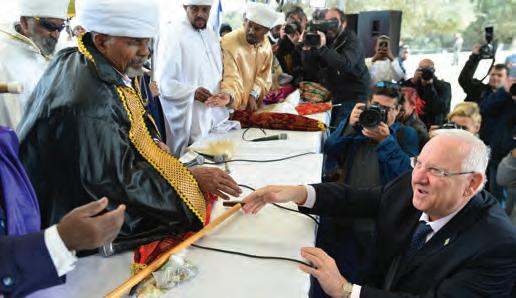
People of the Book
Tal Hartuvn Israeli Tour Guide | Author | Cartoonist
Right on the corner of King George and Ben Yehuda Street in Jerusalem is Pomeranz, the most frequented English book shop in Israel. Desperate for decent bookstores selling English volumes, hundreds of Anglo Israelis come from all over the country to the shop every month.

The astonishing pokey bookstore has the largest selection of Jewish-themed books under one roof in the world.
Both clients and time have a knack for getting lost in the 2-story store whose shelves are piled with books from floor to ceiling. There are even some - so rumour has it - who will mark aside a whole day in their diaries to browse through the thousands of volumes.
In the States, he had worked as an undercover narcotics officer, followed by several years in the fire service, where he even won a gold medal in the fireman’s Olympics for powerlifting. It was at an international gathering of second-generation Holocaust survivors in the USA that his Judaism took a turn. He received an Artscroll Bible as a present and began studying. It wasn’t long before he found himself to be the president of a synagogue which meant he had to deliver a sermon on a regular basis. This meant more study. Michael was hooked on the wonders of Jewish history. Michael knew it was time to come home to Israel.
The Israeli Cabinet has ratified the air transport agreement recently concluded with Turkey. The agreement is among the measures taken as part of the normalization of relations between Ankara and Tel Aviv and paves the way for Israeli airlines to resume flights to Turkey after a 15-year absence.
No surprise then that when the shop’s founder, 68-year-old Michael Pomeranz, passed away a few weeks ago, thousands mourned - yet gave thanks for his life.
It was nearly forty years ago when American-born Michael hopped on a plane to Israel after visiting Poland to pay homage to his family murdered in the Holocaust. When he arrived in Israel, he got on a bus and immediately felt as if he had come home.
Upon making Aliyah with his family, he soon saw that the books for the then small Anglo-Jewish Israeli community were mostly for the ultra-Orthodox. Wanting to supply books for every Jew, no matter their denomination or affiliation with a synagogue, he and his wife took a risk. They emptied their pockets, rented a small basement, and purchased a few hundred books that would be for a wider audience. At night time, when not manning the store, in order to advertise the shop, he hung flyers up in apartment buildings in
areas where English speakers lived. He ran his store with dedication and vision, always looking to make accessible to customers, books about the likes of Zionism, the Bible and spirituality. The business grew so fast that they soon had to find larger premises. But Pomeranz was known to the locals as much more than a business or bookstore. It was a meeting place, a place to come and ask the wise man for guidance and advice. It was also a place of outreach to Jews who had no real connection with their Jewish heritage. Many a time, a stranger walked into the shop and ended up having a Shabbat meal with Michael and his family. Although Michael passed away recently, the “spirit” of the man remains on the cover of every book that he sold.
14 Modern HistoryOctober 2022 | Israel & Christians Today Tishrei - Cheshvan 5783
President Reuven Rivlin, at the prayer service marking the Sigd holiday, the main Ethiopian celebration in Israel. | Photo: Wikimedia Commons
Pomeranz is the largest
Judica English bookstore in Israel.
| Photo: Facebook page @mpomeranz bookseller
From Our Projects
Overview of our projects
A Good and Sweet Year
Valeria Zakharovan Project Coordinator | First Home in the Homeland
The Lord said to Moses, “Say to the Israelites: ‘On the first day of the seventh month you are to have a day of Sabbath rest, a sacred assembly commemorated with trumpet blasts. Do no regular work but present a food offering to the Lord.” Leviticus 23:24
All Jewish people around the world are celebrating Rosh Hashanah – one of the main holidays in Judaism, which name literally means ‘Head of the Year’. This is the time to start from scratch and sum up what was done in the previous year. Last year was extremely challenging.
But despite all obstacles Israel keeps its traditions to make Jewish people even more cohesive and strong! That’s why our important mission as a program is not only to provide our families with intensive Hebrew classes, housing and necessary assistance but also introduce them into a local culture and history.
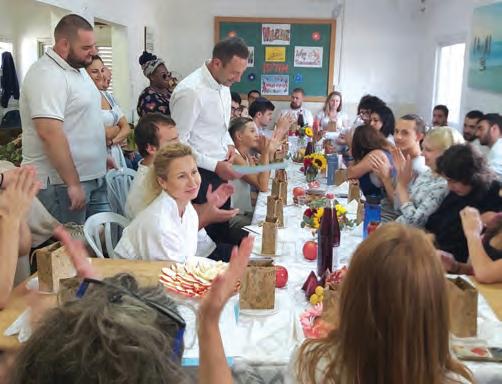
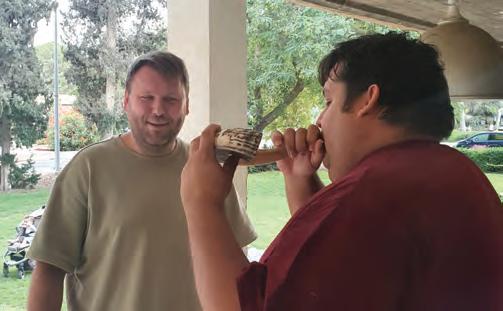
Elvira, a recent arrival at kibbutz Revivim, explains: “We are new here, therefore it is very important to feel that everyone wants to help us become part of this country. I really enjoyed the pleasant and friendly atmosphere of our Rosh Hashanah meeting, which was interesting, informative and warm. We learned a lot about the holiday, its history and traditions. I suppose it will be very useful for the main celebration next week.”
Every year First Home in the Homeland participates from different countries celebrate Rosh Hashanah together and learn about the holiday from their coordinators and educational workshops, while children do the same at school and kindergartens. So, all of them know what they should do with apple and honey, why the shofar (horn) sounds and what our wishes in this holy evening are.
For Lyubov who participants in the programme at kibbutz Zeelim, it was a great introduction to the holiday: “It was not something grand, but cosy and family. Our Hebrew teacher told us about Rosh Hashanah, we listened to songs together, sang them, and, of course, ate apples with honey! Our celebration was really good and sweet!” Have a look at how we are meeting.
Since the beginning of the 2022, First Home in the Homeland programme welcomed more than 220 families. There are over 100 Ukrainian immigrants among them, mostly mothers with children. The participants are spread throughout Israel from the South to the North. The integration of a new immigrant in Israel through First Home in the Homeland costs € 450 | US $465 per person. You can support the programme by filling out the coupon on page 16.

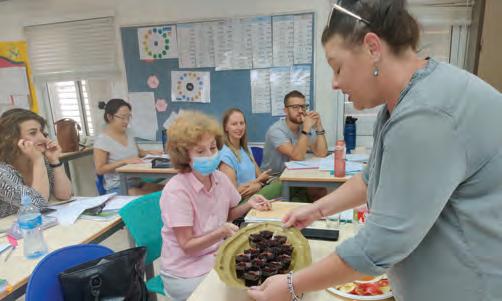
Part of our mission is to comfort Israel and the Jewish people through prayer and action. If you would like to support one of our projects you can complete the coupon on page 16 or make an online donation. Thank you very much for your support!
Aliyah Aliyah is the Hebrew word for the return of the Jewish people to Israel. We support Aliyah mainly from Ukraine (and the former Soviet Union), but also from India and France. Furthermore, we help new immigrants (in Hebrew: olim) to integrate into Israeli society.

Hineni Soup Kitchen
We help the poor of Israel, by providing them with food. We do this in partnership with the Hineni Center in Jerusalem, headed by Benjamin Philip. Your gift for the soup kitchen goes directly to the purchase of food.
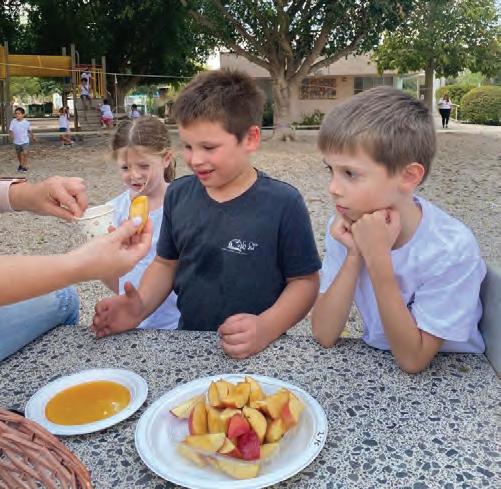
Holocaust Survivors
We support impoverished Holocaust survivors in Israel and Ukraine through various projects which provide assistance to survivors of the Holocaust. Those survivors are elderly and will not be among us for long, and there is a growing demand for practical assistance.
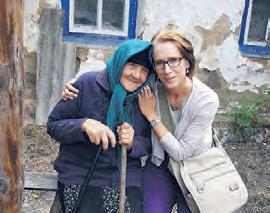
Christian Friends of Israeli Communities (CFOIC)
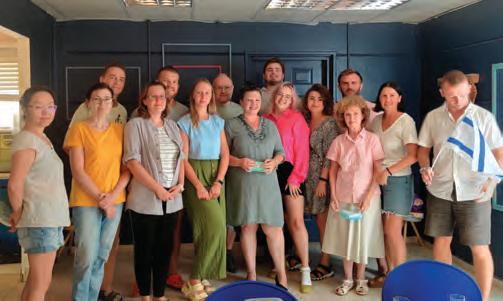
You can support the Jewish communities in Judea and Samaria, the heart of Biblical Israel.
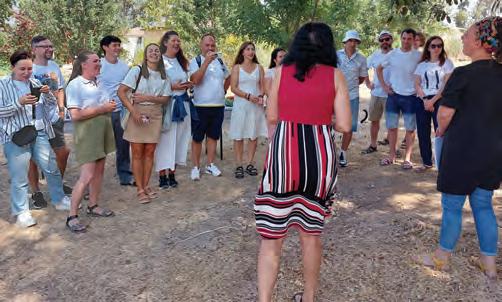
The main purpose is to encourage the people in the Biblical Heartland and to show them that there are Christians throughout the world who support them and share the belief that the areas of Judea and Samaria are part of Israel’s inheritance.

Food Parcel Campaign Ukraine
We distribute food parcels amongst Jewish people in Ukraine.


These parcels are handed out to Holocaust survivors, needy families, and the sick. Those food parcels are a sign of friendship that demonstrates your support for our Jewish brothers and sisters and that they are not alone.
Arab Christians
Life for Christians in Bethlehem is often not easy. Christians for Israel supports the First Baptist Church of Rev Naim Khoury in Bethlehem and Jerusalem. The members of this church spread the gospel among Arabs and share their love and heart for Israel and the Jewish people.
For country-specific or further information on our projects, go to our website, www.c4israel.org
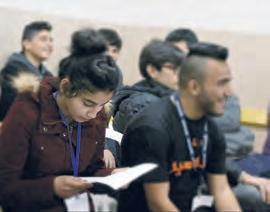
15
October 2022 | Israel & Christians Today Tishrei - Cheshvan 5783
Preparing for Rosh Hashanah at school, Jordan Valley
Kibbutz Merhavia
Eshkol Regional Council (kibbutzim Beeri, Ein Hashlosha, Zeelim)
Eshkol, Rosh Hashanah
Preparing for Rosh Hashanah at school, Jordan Valley
Shofar blowing, Dmirtii Smirnov and Kharchenko Maxim
Celebration in kibbutz Yagur
Keeping Israel’s Neediest Children Safe
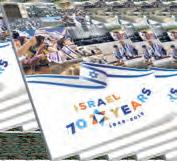
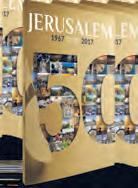

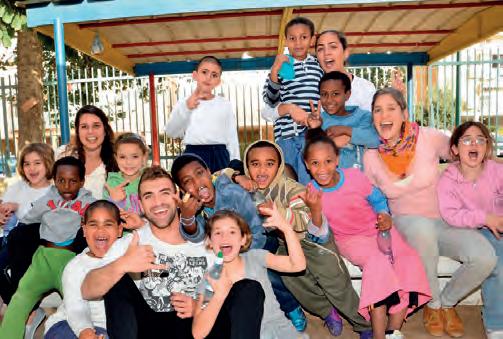
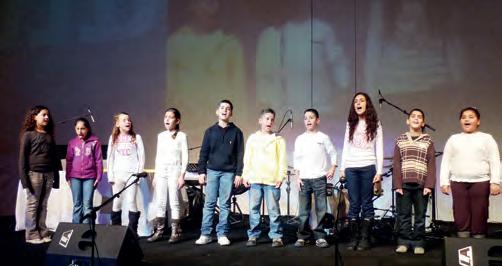 Marie-Louise Weissenböckn Christians for Israel Austria
Marie-Louise Weissenböckn Christians for Israel Austria


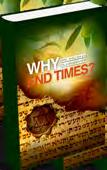


For 40 years, the Jaffa Institute has met a great need by providing after-school care and education to thousands of underprivileged children in Israel. They receive educational, social and material support to escape the cycle of poverty. The children come from different religious, cultural, ethnic and national backgrounds. The Jaffa Institute operates in some of the most deprived and poverty-stricken parts of Israel’s cities, where 50% of the population live below the poverty line and 30% regularly receive local welfare benefits.
Around 1,000 needy children and young people at eight schools in the Jaffa area are provided with a sandwich package every school day.
Many young people from difficult backgrounds become street children due to negligence. To address this problem, the Jaffa Institute operates a campus with three dormitories in Bet Shemesh. Here, children and youth at-risk can experience a safe environment with trained educators. The campus has a sports field, a library and a large dining hall. The Jaffa Institute operates 19 out-of-school educational centers in Jaffa, South Tel Aviv, Bat Yam and Yehud. The children receive a hot lunch and participate in an educational, therapeutic and recreational programme designed to close the educational gap between at-risk children and their better-off peers and to develop the children’s social skills and sense of self-worth. The centers provide participants with a safe and nurturing alternative to being unsupervised on the streets and are open every weekday after school during the school year. A camp programme is offered during school holidays.
Rachel, aged 15

Rachel’s mother is a drugaddict. Her three older siblings were born addicted to narcotics and Rachel recognises that she is ‘lucky’ that she was born healthy. Until the age of five, Rachel was raised by two aunts and moved around frequently. At six years old she was relocated to an ultraOrthodox orphanage /boarding school. While Rachel progressed with her studies, the ultra-Orthodox environment proved trying. Though Rachel’s mother is Jewish, her father is an Arab. At the age of 14, Rachel started rebelling in school. With nowhere to go and no one to turn to, she turned to the streets.
At Beit Ruth Girls’ Hostel, Rachel is part of a community that accepts her for who she is and helps her to achieve her goals. Rachel receives therapy, counseling, academic tutoring and life skills training. She is shown that she can have a future of promise, love and security.
Rachel desperately longs to be reunited with a ‘mother’ and takes to the streets to search for her drug-addicted birthmother during every home visit. Nonetheless, when she returns to Beit Ruth after her visits she says: “It feels good to be back home”. Rachel is bright, charming, and a gifted singer. When asked about goals for the future she is quick to recognise the mistakes of her parents and exclaims: “My dream is for me to raise my own children”.
16 From Our ProjectsOctober 2022 | Israel & Christians Today Tishrei - Cheshvan 5783
You can donate to help the children at risk through the Jaffa Institute by completing the coupon below. YES! I Want to Support Christians for Israel TO MAKE AN ONLINE DONATION: Go to our website: www.c4israel.org/support INTERNET BANKING: Ref: Your name & donation purpose Account Holder: Christians for Israel International Bank Account No: NL12 ABNA 06275.15.460 Bank: ABN-AMRO Bank, Nijkerk, The Netherlands BIC/Swift code: A B N A N L 2 A Please confirm by emailing international@c4israel.org Name: ____________________________________ Address:____________________________________ Phone: ____________________________________ Email: ____________________________________ CHRISTIANS FOR ISRAEL MINISTRY DONATION o My donation for ministry costs, print & post ALIYAH - BRING THE JEWS HOME o One person from Ukraine - € 135 | US $150 ..................... o One family (5 people) - € 675 | US $750 o One bus (25 people) - 5000 ......................€ 4500 | US $ o First Home in the Homeland - € 450 | US $465 ..................... o Bnei Menashe (India) (1 person) - € 950 | US $1000 ..................... o Aliyah Ethiopia SOCIAL WELFARE PROJECTS o Children at Risk - Jaffa Institute $...................... o Hineni Soup Kitchen - $5 per meal $...................... o Holocaust Survivors $.................... o Christian Friends of Israeli Communities (CFOIC) $.................... o Arab Christians $.................... TOTAL DONATION ..................... TEACHING RESOURCES o Israel on Trial (Book) by Andrew Tucker o 70 Questions About Israel (Book) by Chan Siew Fong o Israel 70 Years (One-off Collector’s Magazine) tho Jerusalem 50Anniversary (One-off Collector’s Magazine) o Israel: Covenants & Kingdom (Book) by Willem JJ Glashouwer o Why Israel? (Book) o Why Jerusalem? (Book) o Why End Times? (Book) o Why Israel? (Trilogy Book Set) o Why Israel? Study Guides (Trilogy Book Set) o Why Israel? (DVD) o Why Jerusalem? (DVD) o Why End Times? (DVD) o Why Israel? (Trilogy DVD Set) o Why Israel? (Book, DVD & Study Guide) o Why Jerusalem? (Book, DVD & Study Guide) o Why End Times? (Book, DVD & Study Guide) To order these and other resources, go to www.c4israel.org/webshop











 Understanding Israel and world events from a Biblical perspective
Israel & Christians Today is the premier publication of Christians for Israel
Understanding Israel and world events from a Biblical perspective
Israel & Christians Today is the premier publication of Christians for Israel



































 | Photo: Shutterstock
Kameel Majdalin
Director | Teach All Nations Inc.
| Photo: Shutterstock
Kameel Majdalin
Director | Teach All Nations Inc.




 Weeks Shavu’ot. And so on.
Weeks Shavu’ot. And so on.






















 Marie-Louise Weissenböckn Christians for Israel Austria
Marie-Louise Weissenböckn Christians for Israel Austria





